
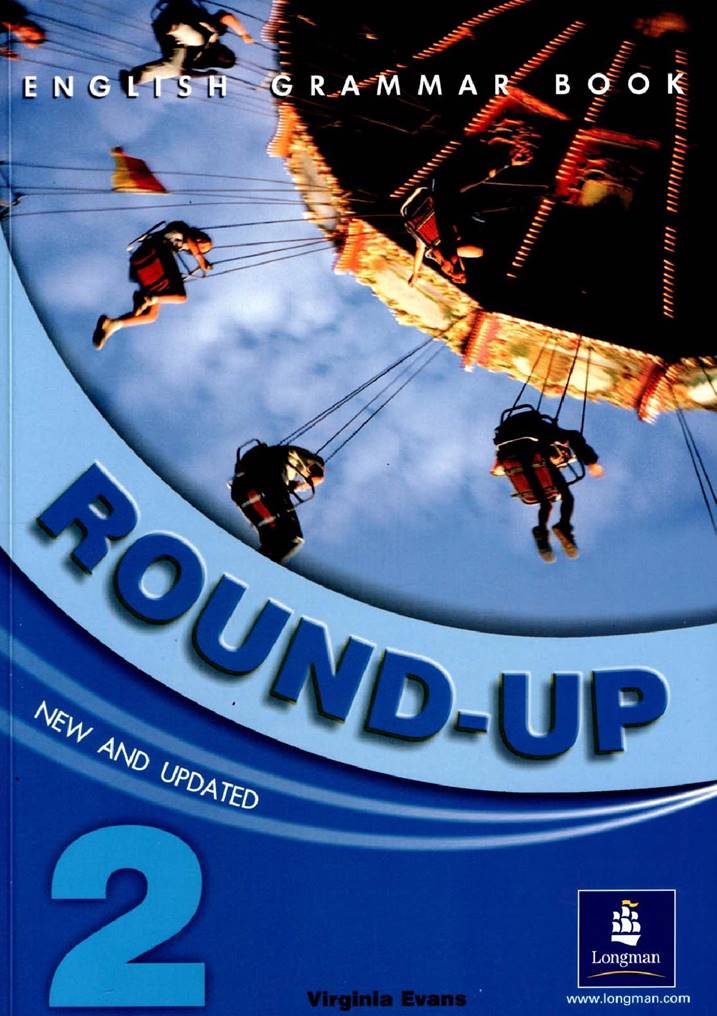
![]() Personal Pronouns 3
Personal Pronouns 3
2. Plurals / This - These / That - Those 12
3. Possessives 20
4. There is — are a / some / any 23
5. Present Continuous 27
Revision Exercises I 34
6. Simple Present 39
7. The Imperative 48
8. Prepositions of Place 49
9. Prepositions of Time 53
10. How much / How many 55
Revision Exercises Il 58
1 1. Be going to 62
 |
|||
![]() Must / Musn't 70
Must / Musn't 70
14. Past Tense (Was — Were) 72
15. Past Tense (Had) 77
Revision Exercises I ll 79
16. Simple Past (Regular Verbs) 87
17. Simple Past (Irregular Verbs) 91
18. Question Words 97
19. Comparisons 100
![]() Revision
Exercises IV 105
Revision
Exercises IV 105
Pre-Tests 1 — 4 112
Progress Tests 125
Wordlist 143
Irregular Verbs 145
Introduction
Round-up Grammar Practice 2 combines games and fun with serious, systematic grammar practice. It is ideal for students at the early stages of English language learning.
Students see grammar points clearly presented in colourful boxes and tables. They practise grammar through lively, highly illustrated games and activities.
Round-up is especially designed for different students studying English in different ways,
It can be used:
• in class with a coursebook. Students do both oral work — in pairs and in groups — and written work in Round-up.
• after class. The 'write-in' activities are ideal for homework. Students can practise what they have learned in the classroom.
• in the holidays for revision. Round-up has clear instructions and simple grammar boxes, so students can study at home without a teacher.
The Round-up Teacher's Guide includes a full answer key and four tests plus answer keys.
Pearson Education Limited
Edinburgh Gate, Harlow Essex CM20 2JE England and Associated Companies throughout the world.
www.longman.com
![]() Virginia Evans 1992
Virginia Evans 1992
All rights reserved: no part of this publication may be reproduced, stored in a retrieval system, or transmitted in any form or by any means, electronic, mechanical, photocopying, recording or otherwise, without the prior written permission of the copyright holder.
First published in 1992 by B & E. Vlachou - "Express Publishers*.
First published by Longman Group Limited 1995.
This edition published by Pearson Education Limited 2003. Fourth impression 2005
Printed in China. GCC/04
Illustrated by Chris Zmertis and Terry Wilson
ISBN 0582 823390
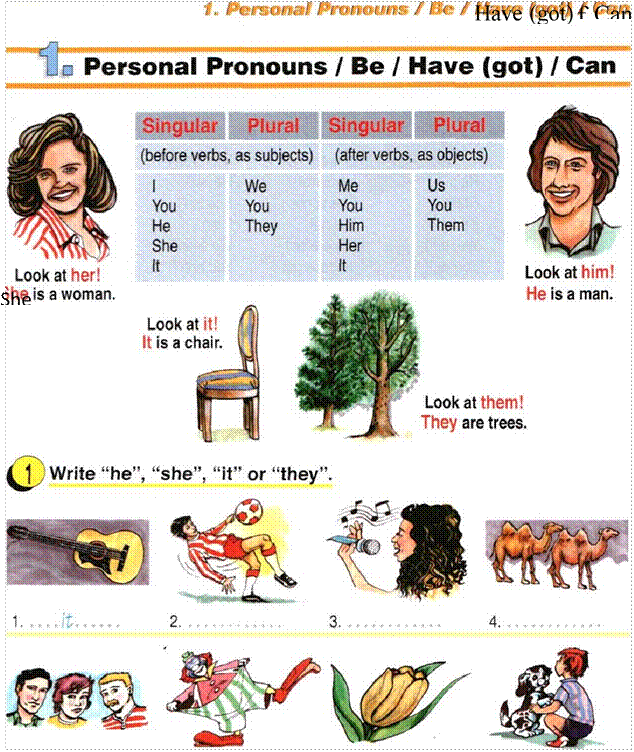 Look at her! Look
at him!
Look at her! Look
at him!
Look at
Itis a chair.
Look at them!
![]() 5. 6. 7. 8.
5. 6. 7. 8.
2 Fill in "he" "she", "it", "we", "you" or "they" as in the example:
1. bed![]() 4. nose
4. nose ![]()
2. doors![]() 5. John
5. John![]()
3. Susan![]() 6. You and I
6. You and I![]()
7.George![]() 10. cups
10. cups![]()
8.You and Ann![]() 11. brother
11. brother![]()
9.grandmother![]() 12. picture
12. picture![]()

|
Long form |
Short form |
Long form |
Short form |
|
|
I am |
I'm |
I am not |
I'm not |
Am l? |
|
You are |
You're |
You are not |
You arent |
Are you? |
|
He is |
He's |
He is not |
He isnt |
Is he? |
|
She is |
She'S |
She is not |
She isn't |
Is she? |
|
It is |
It's |
It is not |
It isn't |
Is it? |
|
We are |
|
We are not |
We aren't |
Are we? |
|
You are |
You're |
You are not |
You aren't |
Are you? |
|
They are |
They're |
They are not |
They arént |
Are they? |
3 Fill in as in the example :
![]()
|
1. They |
are. |
in the garden. |
They're . |
in the garden. |
|
2. She |
|
at home. |
She |
at home. |
|
3. It |
|
a nice day. |
It |
a nice day. |

![]()
![]()
![]()
![]()
![]()
![]()
![]()
![]()
![]()
![]()
![]()
![]()
![]()
![]()
![]()
![]() happy. happy. 5.
happy. happy. 5.![]() hungry hungry.
hungry hungry.
6. You ![]() young. You
young. You![]() young.
young.
9. Ann ![]() a doctor. Ann
a doctor. Ann![]() a doctor.
a doctor.
10. You ![]() a policeman. You
a policeman. You![]() a policeman.
a policeman.
11. She ![]() in the room. She
in the room. She![]() in the room.
in the room.
12. They![]() English. They
English. They![]() English.
English.
![]()
|
Am l/ Are you tall? |
![]() No,
I'm not.
No,
I'm not.
|
s he / she / it in the garden? |
![]()
![]()
![]()
![]() Yes,
he / she / it is. No, he I she / it isn't.
Yes,
he / she / it is. No, he I she / it isn't.![]()
Yes, we / you are. No, we / you aren't. ![]() they they
they they




![]()
![]() 5.
Look at 6. Look
at
5.
Look at 6. Look
at![]()
Is it a snake?


![]()
![]() 8, Look at
8, Look at![]()
Are they eyes?

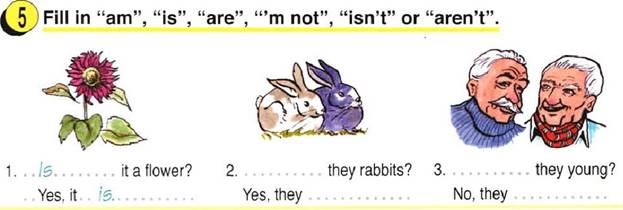 3. they young?
3. they young?
No, they

4. she a doctor? 5.![]() I warm? 6.
I warm? 6.![]() you a teacher?
you a teacher?
No, she![]() No, you
No, you ![]() No, I
No, I![]()

Long form Short form ![]() Long form Short
form
Long form Short
form![]()
|
I have got |
I've got |
I have not (got) |
I havent (got) |
Have I got? |
|
You have got |
You 've got |
You have not (got) |
You haven't (got) |
Have you got? |
|
He has got |
He's got |
|
He hasnt (got) |
Has he got? |
|
She has got |
She's got |
She has not (got) |
She hasnt (got) |
Has she got? |
|
It has got |
It's got |
It has not (got) |
It hasnt (got) |
Has it got? |
|
We have got |
We've got |
We have not (got) |
We
|
Have we got? |
|
You have got |
You've got |
You have not (got) |
You haven't (got) |
Have you got? |
|
They have got |
Theyve got |
They have not (got) |
They haven't (got) |
Have they got? |
6 Fill in the blanks as in the example:
![]()
|
She
|
has
got |
a pen, |
She C got |
|
|
|
1
. 1 |
|
a red dress. |
|
|
|
|
2. Jim |
|
a bicycle. |
Jim |
|
|
|
3.
we |
|
a big house. |
|
|
|
|
4. They |
|
black shoes. |
They |
|
|
|
5. You . |
|
a bottle of milk. |
You |
|
|
|
|
a car. |
We
|
haven't
got . |
|
|
|
6. They |
brown hair. |
They |
|
|
|
|
7, Helen |
a watch. |
Helen |
|
|
|
|
8. You |
a garden. |
You |
|
|
|
|
9. It |
wings. |
It |
|
|
|
|
10. I |
a ring. |
|
|
||
7 First say and then write questions and answers as in the example:

some books a boat a parrot a bicycle a guitar

You
1. What has Mary got? She has got sorne books, a bicycle and a . ![]()
![]() guitar,
She hasn't got a boat or a parrot.
guitar,
She hasn't got a boat or a parrot.![]()
2.![]()
![]()
![]()
![]()
4, What have you got? I![]()
![]()
![]()
|
Have you got a car? |
Yes, I /we have. |
No, I [we haven't. |
|
Has he/ she/ it got a car? |
Yes, he / she/ it has. |
No, he / she/ it hasn't. |
|
Have they got a car? |
Yes, they have. |
No, they haven't. |
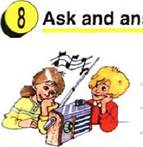
 8 Ask and answer as in the example:
8 Ask and answer as in the example:
1. they la TV?
Have they got a TV?
No, they haven't.![]()
They've got 6 raåÏâ


|
|
|
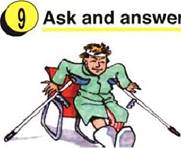 Yes, I can. Can you
drive?
Yes, I can. Can you
drive?
![]() No, I
can't.
No, I
can't.
 |
![]()
![]() "can"
"can"

7. (fly)![]() 8. (sleep)
8. (sleep) ![]() 9. (sing)
9. (sing)![]()
![]()

sing draw dance play the guitar

1. . Can Jane sing? Yes, she can. Can
she draw? No, she can't. Can she![]()
![]() .åance? Yes, she can. Can she
play the guitar? No, she can't. So,
.åance? Yes, she can. Can she
play the guitar? No, she can't. So, ![]() .
.Jane can sing and dance but she can't draw or play the guitar,
.
.Jane can sing and dance but she can't draw or play the guitar, ![]() 2.
2.![]()
![]()
![]()
3.![]()
![]()
![]()
4.![]()
Il Look and write:
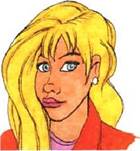 Name. Mary
Taylor She
is Vary Taylor.
Name. Mary
Taylor She
is Vary Taylor.![]()
Nationality: American She
is Arnerfcan. ![]()
Job: singer She is a singer.
Hair: blonde She has got blonde hair Eyes: blue anå
blue eyes,![]()
Abilities: sing, dance She can sing and dance,
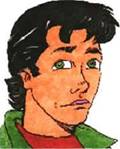 Name: Simon
Flower
Name: Simon
Flower ![]()
Nationality: British
Job: teacher ![]()
Hair: black![]()
Eyes. green ![]()
|
|
Name: |
|
|
|
YOU |
Nationality: |
|
|
![]()
 Hair:
Hair:![]()
Eyes:![]()
Abilities:![]()
![]()
Guessing Game 1
![]() Your teacher divides the class into
two groups. Then he / she asks a student to come to the front of the class. The
teacher whispers a verb e.g 'fiMite" into his I her ear, The students, by
asking questions, try to guess what he/she can do. The group which finds out
wins. Group A Sl
Your teacher divides the class into
two groups. Then he / she asks a student to come to the front of the class. The
teacher whispers a verb e.g 'fiMite" into his I her ear, The students, by
asking questions, try to guess what he/she can do. The group which finds out
wins. Group A Sl![]() Can you dive? Group A S2: Can you swim? Leader: No, I can't.Leader: No, I
can't.
Can you dive? Group A S2: Can you swim? Leader: No, I can't.Leader: No, I
can't.
Group B Sl![]() Can you play tennis? Group B S2. Can you write? Leader: No, I
can't.Leader: Yes, I can, Group B gets 1 point. Choose another leader and play
the game again.
Can you play tennis? Group B S2. Can you write? Leader: No, I
can't.Leader: Yes, I can, Group B gets 1 point. Choose another leader and play
the game again.
![]()
Competition Game 2
Your teacher divides the class into two groups. Play the game as follows:
![]() Teacher: PamGroup
BSI: he
Teacher: PamGroup
BSI: he
Group A Sl. sheTeacher: Mary and I
Teacher: ChrisGroup A S2: they
Teacher: Wrong! We. Group A gets no point.
Each
correct answer gets 1 point. The group with the ![]() points is the
points is the![]()
![]()
Guessing Game 3
Your teacher divides the class into two groups, chooses a leader and asks him / her to think of a job. Then the groups in turn try to guess what his/ her job is.
|
Group A |
Are you a teacher? |
|
No, I'm not. |
|
Leader: |
No, I'm not. |
Group A S2: |
Are you a butcher? |
|
Group BSI: |
Are you a singer? |
Leader: |
Yes, I am. etc. |
Group A
is the winner. Choose another leader and play the game ![]()
![]()
Guessing Game 4a
Your teacher divides the class into two groups, chooses a leader and asks him / her to think of 5 items he / she has got and write them on a piece Of paper. Then the groups in turn try to find what the leader has got by asking only ten questions. The group which has found most or all of the things the leader has got is the winneL
![]() Group A Sl
Group A Sl![]() Have you got an umbrella? Group A S2:
Have you got a bag? Leader: Yes, have.Leader: No, I haven't.
Have you got an umbrella? Group A S2:
Have you got a bag? Leader: Yes, have.Leader: No, I haven't.
Group
BSI . Have you got a cat? Group B S2:![]() Have you got a dog? Leader: No, I haven't.Leader:
Yes, I have, etc.
Have you got a dog? Leader: No, I haven't.Leader:
Yes, I have, etc.
One student starts saying what he / she has got. The next student goes on to say what the previous student has got adding what he / she has got.
Sl: I've got a dog.
S2: He's got a dog and I've got a cat.
S3: She's got a cat and I've got a bag. etc.
a Plurals / This • These / That - Those
Most nouns form their plural by adding![]()
cameras, chairs, snakes, parrots, doctors.

1. one apple two , apples. 2. one bird two 3. one shoe two

4. one dolphin two 5.
one clown two 6. one spider two![]()
Nouns ending in s, ss, sh, ch, x and o take "es" in the plural.
bus buses brush - brushes box • boxes glass - glasses match - matches potato - potatoes BUT:
radio - radios, piano - pianos, photo - photos, video -videos

1. one watch two watches 2 one fox two 3. one mosquito two
 4. one bench two
4. one bench two
Nouns ending in a consonant + y ies
Nouns ending in a vowel (a,e,i,o,u) + y ![]()
|
city - cities |
BUT |
boy - boys |

1. one toy three toy; 2, one lady two![]() 3. one baby two
3. one baby two

4. one family two 5. one diary two 6. one fly two
Some nouns ending in f/ fe ves
|
thief • thieves |
knife - knives |
B |
T |
roof - roofs |

I, one leaf two leaves 2, one loaf two![]() 3. one wolf two
3. one wolf two![]()
/
Irregular Plurals
|
tooth - teeth fish - fish foot - feet |
mouse- mice deer - deer goose - geese |
ox - oxen sheep - sheep man - men |
child - children woman - women |
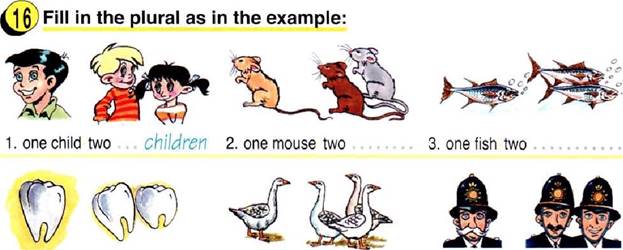
4. one tooth
two ![]() 5.
one goose three 6. one policeman two
5.
one goose three 6. one policeman two![]()
|
Note: |
Adjectives take no |
s in the plural. |
e.g. an old book - old books |
17 Write the words in the plural and in the correct column.
party - banana - tomato room - day - wife - sandwich story • bus - class • radio - fly - knife - lady - leaf

18 Complete as in the example:
1. A pen. Two . . pens.. ![]()
3. A
cowboy. Two ![]()
5. A
house, Three ![]()
 |
2. A bus, Ten![]()
4. A
woman. Two![]()
6. A
fish. Three![]()
 7. A tooth. Five 8.
A key. Four
7. A tooth. Five 8.
A key. Four![]()
9, A spy' Two 10.
A picture. Three![]()
11.A letter.
Three 12
A shirt. Two![]()
13.A table. Two 14.
A child. Two![]()
15. A girl. Four 16.
A class, Three![]()
1 TA tail. Two 18.
A disc jockey. Two![]()
19. A
Sheep. Ten![]() 20. A zebra. Two
20. A zebra. Two![]()
19 Change to the plural as in the example:
The dog is in the garden, . The dogs
are in the garden..![]()
j. He
is a tall man.![]()
2. It
is a potato.![]()
3, It
is a beautiful dress.![]()
4.
The glass is on
the table.![]()
5.
It is a tooth.![]()
6, The
baby is in the bedroom.![]()
7, You
are a nice child,![]()
8.
9.
It is a leaf. ![]() 10, It is a monkey.
10, It is a monkey.![]()
Some nouns are uncountable-They have no plural. These are:
|
bread lemonade butter money |
cheese tea coffee water |
jam juice meat wood |
milk Coca-Cola sugar paper |
|
Note: A / an is not used with uncountable nouns. Some is used instead. We say: a cup BUT some bread |
|||

![]() water 2. dolphin 3. sugar 4. flag
water 2. dolphin 3. sugar 4. flag


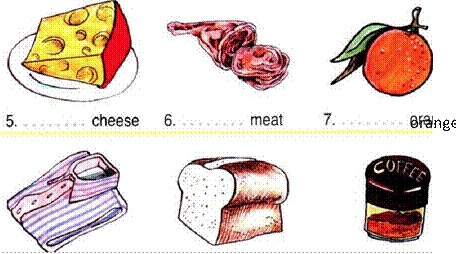 8. money
8. money
9. shirt 10. bread 11 . coffee 12. doll

13. butter 14. milk 15. sailor 16.![]() jam
jam
Uncountable nouns can be made countable by using these words:

a bottle a cup a slice of milk a glass of tea a loaf of bread a packet of water of bread of tea

a jar a piece a carton of jam a can of cheese a bowl of milk a kilo of Coke of sugar of meat
Z
Z ![]() / -
/ -
21 Fill in the correct word as in the example:

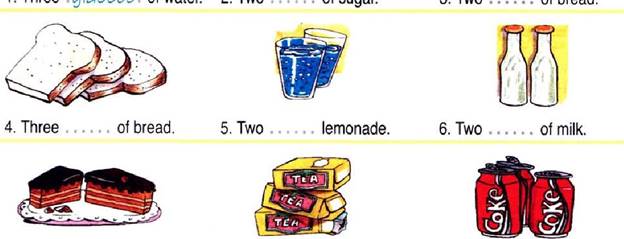 1. Three . glasses. of water. 2.
Two of sugar. 3. Two of bread.
1. Three . glasses. of water. 2.
Two of sugar. 3. Two of bread.
 7. Two of
cake. 8. Three of tea.
7. Two of
cake. 8. Three of tea.
10. Two of coffee. Il,
Three![]() of jam, 12. Three
of jam, 12. Three![]() of cheese.
of cheese.
22 Fill in the plural as in the example:
1.
A dog. Three A
lady. Three![]()
2.
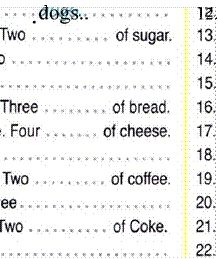 Some
sugar. Two A child. Three
Some
sugar. Two A child. Three![]()
3.
A church. Two
Some lemonade. Two![]() of lemonade. 4, A team. Two Some water. Two
of lemonade. 4, A team. Two Some water. Two![]() of water.
of water.
5. Some bread. Three A
day, Five![]()
6, Some cheese. Four Some
tea. Three![]() of tea.
of tea.
7. A horse. Two Some milk. Three![]() of milk.
of milk.
8. Some coffee. Two A goose. Two![]()
9. A bicycle. Three Some jam. Four![]() of jam.
of jam.
10.Some Coke. Two A mouse. Two![]()
11.A boy, Three Some meat. Two![]() of meat.
of meat.
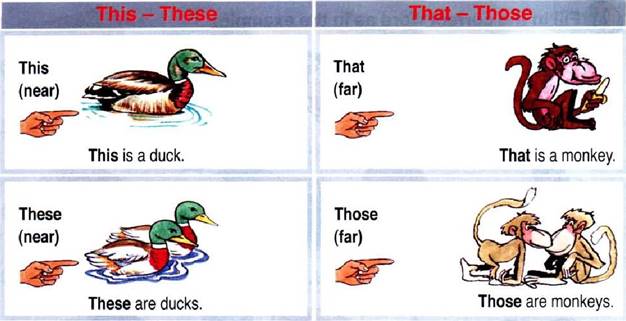
23 Fill in the blanks with "This", "These", "That" or "Those".
1.
.This.
. is a candle. 
2.
![]() are socks.
are socks. 
3.
![]() is a donkey.
is a donkey. 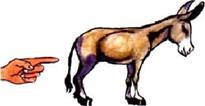
4.
![]() are fish.
are fish. 
2. Thes -
5.
are burgers. 
6.
![]() is a crocodile.
is a crocodile. 
![]()

Guessing Game 5
The teacher chooses a leader and then divides the class into two groups, group A and group B. Then the teacher writes a singular or plural noun on a piece of paper (e.g. pencils) which he/she gives to the leader. Finally, the teacher invites the students to guess what he / she has written by asking the leader questions in turn. The students can ask the leader ten questions in order to find it. If the groups cannot guess within 10 questions, the game is a draw.
![]() Group A Sl
Group A Sl![]() Is it singular or plural? Group
A S2. Are they pens?
Is it singular or plural? Group
A S2. Are they pens?
Leader: Plural.Leader: No, they arent.
Group B
Sl![]() Are they chairs? Group B S2: Are they pencils? Leader: No, they
arent.Leader: Yes, they are.
Are they chairs? Group B S2: Are they pencils? Leader: No, they
arent.Leader: Yes, they are.
The teacher divides the class into two groups and says nouns in the singular. The groups in turn say the plural of each word. Each correct answer gets 1 point. The group with the most points is the winner.
![]() Teacher . cat Teacher
Teacher . cat Teacher![]() ox
ox
Group A Sl![]() cats Group
A S2 : oxes
cats Group
A S2 : oxes
Teacher . footTeacher : Wrong! oxen. Group A Group BSI . feetgets no point.
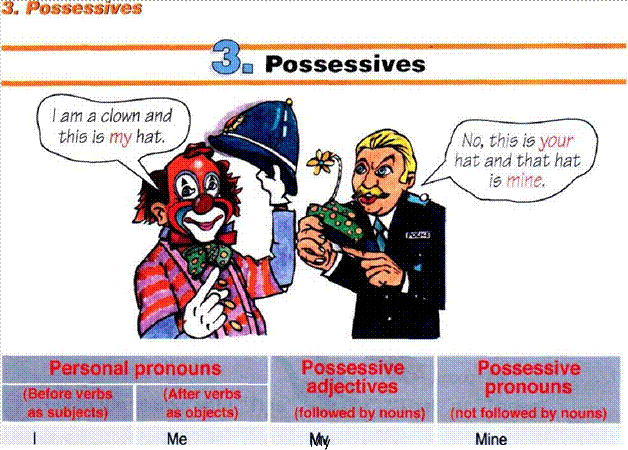
You
He She / it
We
You ![]()
You Your
Him / Her / It His / Her / Its
Us Our
You![]() Your
Your ![]()
Yours
His / Hers / — ![]() Ours
Ours
Yours
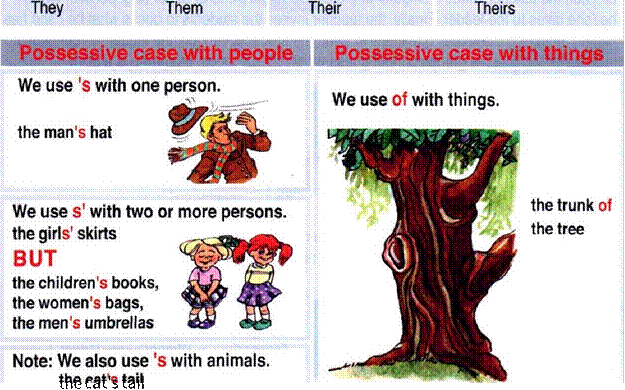 They Their Theirs
They Their Theirs
 24 Look at the pictures and write
as in the example:
24 Look at the pictures and write
as in the example:
1. This is peter's .
umbrella . umbrella,
It's .hi6 umbrella.. This umbrella is his..
the
girls
Ben  flowers
flowers 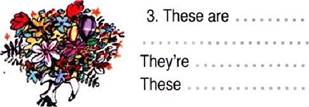


![]()
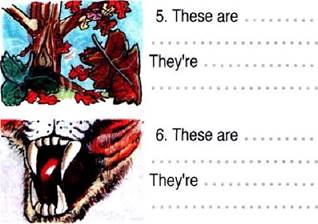 4. This is
4. This is ![]() the dog bone
the dog bone ![]()
It's![]()
the treeleaves
the tigerteeth
Mother newspaper

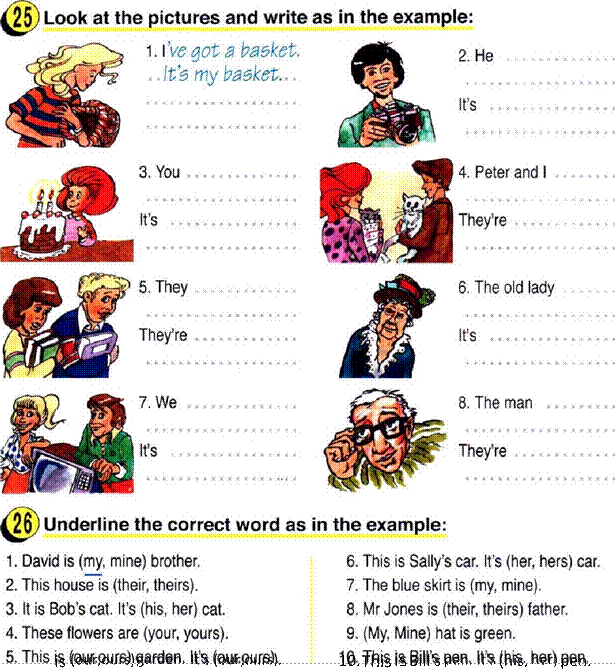
Game 7
Your teacher divides the class into two groups. Then he /she gives cues and each group in turn tries to say the correct possessive. Each correct answer gets 1 point. The group with the most points is the winner
![]() Teacher . Mary
/ bagTeacher : woman
I car
Teacher . Mary
/ bagTeacher : woman
I car
Group ASI . her bag Group
A S2![]() her car
her car
Teacher![]() children / books Teacher
: I / pen
children / books Teacher
: I / pen
Group B Sl![]() their books Group
B S2
their books Group
B S2![]() my pen etc.
my pen etc.
|
|
|
|
|
|
|
|
a |
There is — are |
a / some I any |
|
![]()

There is
are a Z some any
27 Write "There is" or "There are" as in the example:
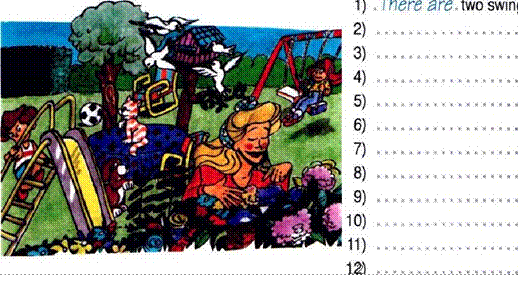 i) There are. two swings in the
garden. a slide, two children. a woman. a table.
i) There are. two swings in the
garden. a slide, two children. a woman. a table.
two chairs. lots of flowers.
![]() a cat. four birds. a ball. two trees. a dog.
a cat. four birds. a ball. two trees. a dog.
![]() some + countable or any + countable
or uncountable noununcountable noun
some + countable or any + countable
or uncountable noununcountable noun

![]()
![]()
![]() (in affirmative sentences)(in
questions and negative sentences)
(in affirmative sentences)(in
questions and negative sentences)
![]() Are there any oranges? There are some
tomatoes.
Are there any oranges? There are some
tomatoes.
![]() There is some bread.
There is some bread.
28 Fill in "some" or "any".
![]() I. Are there any . children in the
park?
I. Are there any . children in the
park?
3.
There are![]() flowers in the garden.
flowers in the garden.
5.
There isn't![]() bread in the cupboard,
bread in the cupboard,
7.
There is![]() lemonade in the bottle.
lemonade in the bottle.
Is there any milk?
![]() No, there isnt any milk,
No, there isnt any milk,
![]()
![]()
![]()
![]()
![]()
![]()
![]()
![]() 2. Are thereeggs on the table?
2. Are thereeggs on the table?
![]()
![]()
![]()
![]()
![]()
![]()
![]() 4. There isntmeat in the shop.
4. There isntmeat in the shop.
![]()
![]()
![]()
![]()
![]()
![]()
![]() 6. There areapples on the tree.
6. There areapples on the tree.
![]()
![]()
![]()
![]()
![]()
![]()
![]()
![]()
![]() 8. There ismilk in the bottle.
8. There ismilk in the bottle.
![]() 9. There isnt
9. There isnt![]() water in the glass. 10.
There are
water in the glass. 10.
There are![]() potatoes on the table.
potatoes on the table.
11. There is![]() tea in the teapot. 12.
Is there
tea in the teapot. 12.
Is there![]() chocolate in the fridge?
chocolate in the fridge?
13. Are there![]() . children in the room? 14.
There is
. children in the room? 14.
There is![]() cheese on the plate.
cheese on the plate.
15. There aren't![]() cars in the street. 16.
Are there
cars in the street. 16.
Are there![]() cakes in the cupboard?
cakes in the cupboard?
29 Look at the picture and write sentences as in the example:
![]()
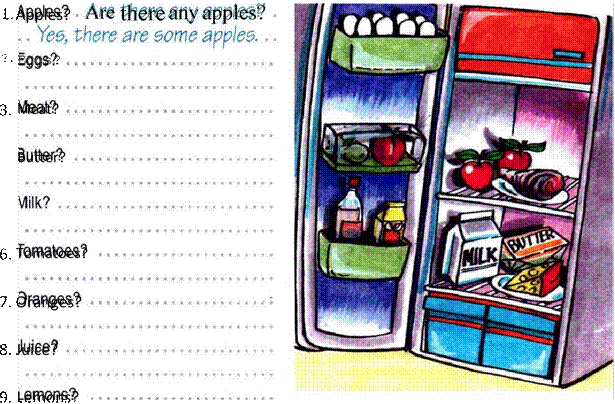 4.
4.
5. Milk?
![]()
30 Now write what there is or there isn't in the fridge in your kitchen.
![]() There j5 some meat. There
There j5 some meat. There![]()
![]()
![]()
![]()
![]()
![]()
31 Look at the picture and write sentences as in the example:
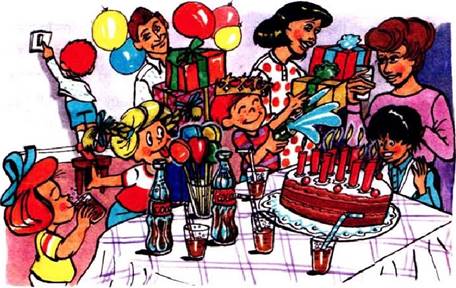
![]()
3.
Three candles? ![]()
![]()
4.
Two boys? ![]()
![]()
5.
Two girls? ![]()
![]()
6.
One bottle of
Coca-Cola?![]()
![]()
7.
Five glasses? ![]()
![]()
8.
One box? ![]()
![]()
![]() 9.
One woman?
9.
One woman? ![]()
![]()
10.
One man?![]()
![]()
11.
Five lollipops? ![]()
32 Fill in "There is", "There are", "Is there" or "Are there".
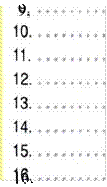
![]() 1, Are there. any people on the
bus?any money in your pocket?
1, Are there. any people on the
bus?any money in your pocket?
2.
![]() any cheese in the sandwich? any horses in the field?
any cheese in the sandwich? any horses in the field?
3.
![]() some books in my bag. some Coca-Cola in that glass.
some books in my bag. some Coca-Cola in that glass.
4.
![]() some meat in the fridge. some letters on the table.
some meat in the fridge. some letters on the table.
5.
![]() any sugar in this tea? any water in the bottle?
any sugar in this tea? any water in the bottle?
6. some dogs in the garden,any chairs in the room?
![]() a policeman in that car. some
paper on the desk.
a policeman in that car. some
paper on the desk.
8.any matches in the matchbox?a cat under the tree.
Guessing Game 8
The teacher chooses a leader from the class and tells him /her to imagine a fridge with 5 items inside (eg, milk, cheese, tomatoes, Coke, eggs), Then he / she divides the class into two groups and the groups in turn ask the leader questions about what is in the fridge. The group which finds most or all of the items within 10 questions wins.
|
Group A |
Is there any milk in the fridge? |
|
|
Leader |
Yes, there is some milk in the fridge. |
|
|
Group B Sl |
Is there any butter in the fridge? |
|
|
Leader . |
No, there isn't any butter in the fridge. |
|
|
Group A S2 |
Is there any cheese in the fridge? |
|
|
Leader |
Yes, there is some cheese in the fridge. |
etc. |
The teacher divides the class into two groups and asks the students to look at the picture to ex 27 for i minute. Then the students close their books and the groups in turn try to remember as many items as possible. The group which finds most or all of the items wins.
|
Group A Sl: |
There's a slide in the picture. |
|
|
Group B Sl: |
There's a ball in the picture. |
|
|
Group A S2: |
There's a tree in the picture. |
etc. |

![]() Long form Short
form Long form Short
form
Long form Short
form Long form Short
form
|
|
|
|
|||||||||||||||||||||||||||||||||||
|
|
|||||||||||||||||||||||||||||||||||||
|
|
They are working They're working They are not working They arent working Are they working?
![]()
We use Present Continuous for temporary actions.
Look at the spelling of these verbs.
|
run - running dig - digging lie - lying |
BUT |
work -working walk - walking play - playing |
open - opening listen - listening etc. |
33 Add -ing to the verbs.
|
1. get |
,
getting. |
|
7. drink |
|
2. swim |
|
5. watch |
8. put |
|
3. stop |
|
6. listen |
9. dig |
Look at the spelling of these verbs:
|
dance - dancing |
have • having etc. |
|
|
|
34 Add -ing to the verbs.
![]()
1. 
 live4. drive7. ride
live4. drive7. ride
2. write 5. smoke 8. make![]()
3. close 6. come 9. take![]()
35 Add -ing to the verbs.
1. 
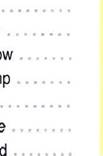
 sing 8. go 15. draw 22. live
sing 8. go 15. draw 22. live![]()
2. read 9. win . 16. score 23. play![]()
3. open 10. show 17. bring 24.
wake ![]()
4. eat 11. jump 18. help 25.
move ![]()
5. wash 12. fly 19. look 26.
visit![]()
6, count 13,
give 20, dream 27. have![]()
![]()
|
|
|
|
|
ress onsv |
|
|
ent |
|
now ![]() at the moment
at the moment ![]() at present
at present
![]()
![]()
|
|
Yes, I am |
|
36 Write short answers. |
|
Are you sleeping? |
No, I'm not, |
|
I. Is the dog barking? Yes, 2. Are the girls laughing? No, they aren't, |
|
|
|
|
3. Are you doing your homework? No,
|
|
|
Yes, she is. |
|
|
![]()
![]()
![]()
![]()
![]()
![]()
![]()
![]()
![]()
![]()
![]()
![]()
![]()
![]()
![]()
![]()
![]()
![]()
![]()
![]()
![]() he it
he it ![]() 5. Are they watching
television? Yes,
5. Are they watching
television? Yes,![]()
Is she sleeping? ![]() 6. Is it raining outside? No,
6. Is it raining outside? No,![]()
|
No, she isdt. it |
8. Are they watering the flowers?
Yes |
![]() it
it ![]() he
he ![]() 7. Is she running? Yes
7. Is she running? Yes
9. Is he putting on his coat? No
![]()
10. ![]() Are they digging in the garden? No,
Are they digging in the garden? No,
![]() Yes, they are.
Yes, they are. ![]()
Are they sleeping? Il
, Are you writing a letter? Yes![]()
![]()
![]() No,
they aren't. 12. Are they listening to the radio? No,
No,
they aren't. 12. Are they listening to the radio? No,
![]()
3 7 Match the sentences with the pictures as in the example:
Grandpa is sleeping.
Carol is listening to the radio.
They are eating.
The cat is jumping,
Sarah and John are cooking.
Sally is crying.
Jane is dancing.
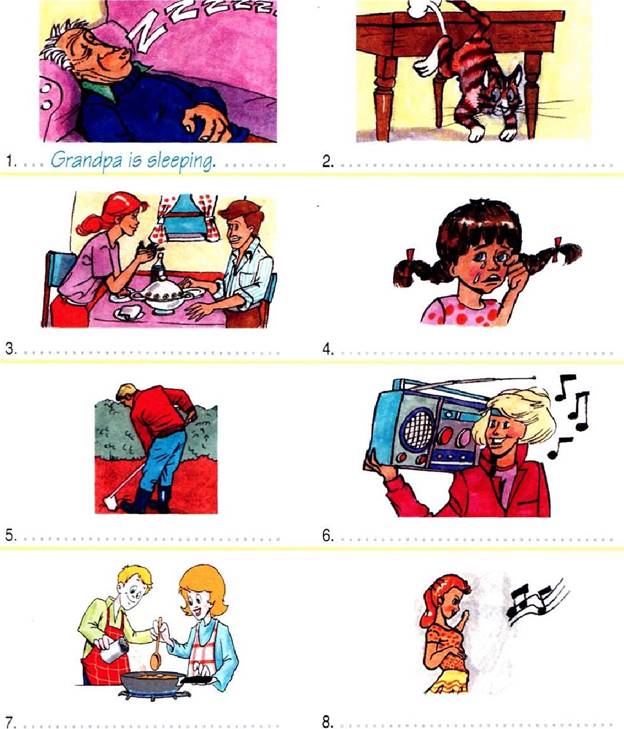
Father is digging in the
garden.


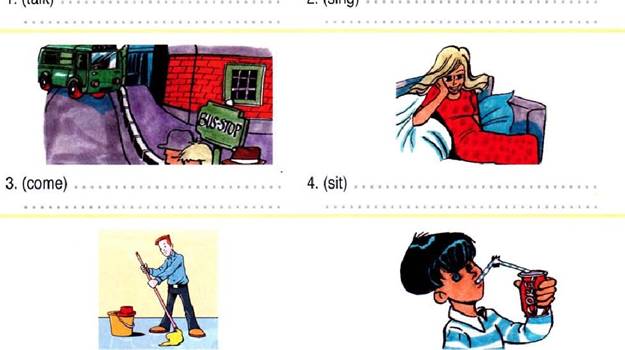
 5, (wash the floor) 6,
(drink Coke)
5, (wash the floor) 6,
(drink Coke)
7, (open the window) 8 (write)
39 Fill in the blanks with the correct form of the verb.
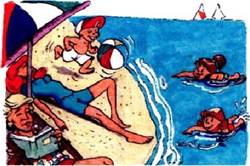 It is Sunday morning and the family is
on the beach. Mrs Fairfax 1) . is sleeping (sleep)
It is Sunday morning and the family is
on the beach. Mrs Fairfax 1) . is sleeping (sleep)
under a sun-umbrella.
Mr
Fairfax 2)![]() (read) a book. Their two daughters 3)
(read) a book. Their two daughters 3)![]() (swim) in the sea Their son 4)
(swim) in the sea Their son 4)![]() (play) with a ball.
(play) with a ball.
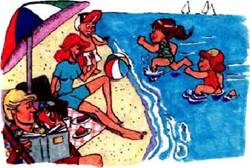 It is noon and the family is on the
beach.
It is noon and the family is on the
beach.
Look!
The two girls 5) ![]() (run) towards the boy, Mrs Fairfax 6)
(run) towards the boy, Mrs Fairfax 6)![]() (call) them. Mr Fairfax 7)
(call) them. Mr Fairfax 7)![]() (drink) some Coke and he 8)
(drink) some Coke and he 8)![]() (read)
(read)
a book.
 It is Sunday
afternoon and their picnic is ready.
It is Sunday
afternoon and their picnic is ready.
They 9)![]() (enjoy) their picnic. They 10)
(enjoy) their picnic. They 10)![]() (eat) sandwiches. John Il )
(eat) sandwiches. John Il )![]() (not/eat) his sandwich. He 12)
(not/eat) his sandwich. He 12)![]() (feed) the birds. They 13)
(feed) the birds. They 13)![]() (have) a wonderful day.
(have) a wonderful day.
40
Read the short
texts above then ask and answer questions. ![]() . What is Mr Fairfax doing in picture
1? He is reading a book.
. What is Mr Fairfax doing in picture
1? He is reading a book.![]()
2.
![]()
![]()
3.![]()
4.![]()
![]()
5.![]()
41
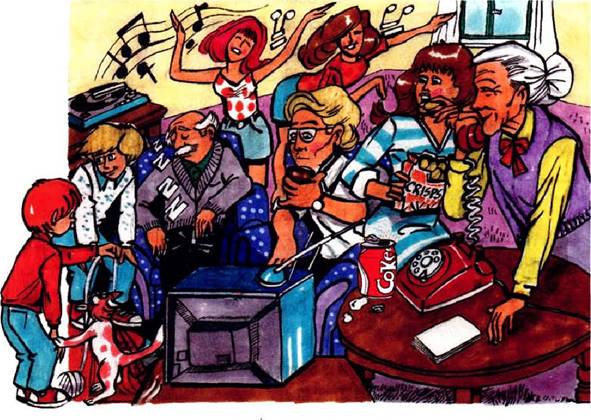
1 . Father is talking on the phone. Wrong!
Father isn't talking on the phone, ![]()
![]() He's
drinking Coke.
He's
drinking Coke.![]()
2. Grandpa is listening to music.![]()
![]()
3, Father and mother are playing with the
cat.![]()
![]()
4, The boys are drinking Coke.![]()
![]()
5.
Mother
is sleeping.![]()
![]()
6.
Sue
and Pam are watching TV,![]()
![]()
7.
Grandma
is writing.![]()
![]()
8.
The
cat is eating.![]()
42 Complete the sentences using the words in brackets.
What is my father doing in the living-room?
(read I book) He
is reaåing a book.![]()
1. What are Tom and Tina doing in the disco?
(dance)![]()
2. What are you doing?
(listen I records)![]()
3. What is the baby doing?
(cry)![]()
4. What is your sister doing in the bathroom?
(have / a bath)![]()
5. What are the boys doing in the park?
(play / football)![]()
43 Ask questions which match the answers as in the example:
|
|
|
No, mother isnt cooking dinner. |
|
2. |
|
Yes, that man is cleaning the window. |
|
3. |
|
No, I am not swimming. |
|
4. |
|
Yes, we are going to the cinema tonight. |
|
5 |
|
No, it isn't raining today. |
|
6. |
|
Yes, the teacher is writing on the blackboard. |
|
7. |
|
Yes, the boys are swimming. |
|
8. |
|
No, you are not wearing a black shirt. |
|
9. |
|
No, I'm not washing my face. |
|
10. |
|
No, the dog isn't sleeping. |
Your teacher divides the class into two groups. Then, he Ishe asks a student (the leader) to come to the front of the class. The leader writes what the teacher is doing on a piece of paper (eg. He is writing). The students, by asking questions, try to guess what the teacher is doing.
|
Group A Sl. |
Is he sleeping? |
Leader: |
No, he isn't. |
|
Leader: |
No, he isn't. |
Group A S2: |
Is he writing? |
|
Group B Sl |
Is he reading? |
Leader: |
Yes, he is. |
Group A wins this time. Your teacher may choose another leader and you can play the game again.
I

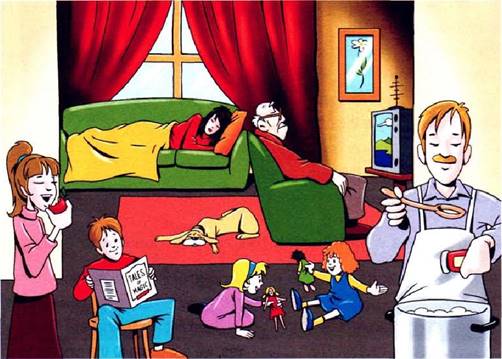
Father (1) . is cooking (cook).
John (2) ![]() (read). Jane (3)
(read). Jane (3)![]()
(eat)
an apple. Mother (4) ![]() (sleep). Grandfather (5)
(sleep). Grandfather (5)![]()
(watch)
TV, The dog (6) ![]() (lie) on the carpet. The girls (7)
(lie) on the carpet. The girls (7)
![]() (play) with their dolls.
(play) with their dolls.
Now look at the above picture and ask and answer.
1. (Mother [wear / blue jumper?) 16 Mother wearing a
blue jumper?![]()
(red jumper)
2, (John / write / a letter?)
(read / book)
3. (Jane I eat / a banana?)
(eat / apple)
4. (Grandfather / listen / radio?)
(watch / TV)
5. (dog / sleep / on the chair?)
(sleep / carpet)
No, she isn't. She is wearing a red jumper:![]()
![]()
![]()
![]()
![]()
![]()
![]()
![]()
6. (Father / watch TV?) ![]()
(he I sleep) ![]()
45 Fill in "he", "she " , "it" "we" "you" or "they".
1, You and John you. 5,
eyes ![]()
![]() 2. Sally and I 6.
sister
2. Sally and I 6.
sister ![]()
3, Jane and Mary 7.
pen ![]()
4. book 8.
brother ![]()
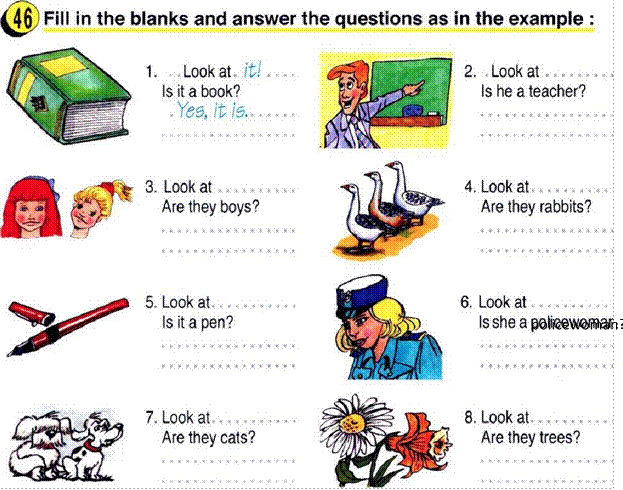
47
![]()
![]() Ask and answer as in the example :
Ask and answer as in the example :
1. she / a doll?
Has she got a doll?
No, she hasn't.
She's got a book,. .
35

48 Change to the plural.
1. ![]() My cat is black. Our cats are black..
My cat is black. Our cats are black..
2. This dog is white. ![]() 3. He is an old man.
3. He is an old man.![]()
4. This
is a fat cat. ![]()
 4, the cat / a mouse?
4, the cat / a mouse?
 6. the dog / a doll?
6. the dog / a doll?
6. I am tall.![]()
7.
8. This fox is brown.![]()
9. He is a good doctor.![]()
5. She
is a good teacher,![]() 10. It is a book.
10. It is a book.![]()
49 Fill in "This", "These" or "That".
i . This is a basket. 
2.
is a shark. ![]()
3.
are flowers. 
is a picture.
50 Underline the correct word.
![]() 1 . This book is (my / mine).
1 . This book is (my / mine).
2, Mr Smith is (their / theirs) teacher.
3, This is (our / ours) house.
4. (My / Mine) dog is black and white.

5. The black skirt is (her / hers).
6. This is John's book. It is (his / her).
7. This car is (their / theirs).
8. Dr Black is (her / hers) doctor.
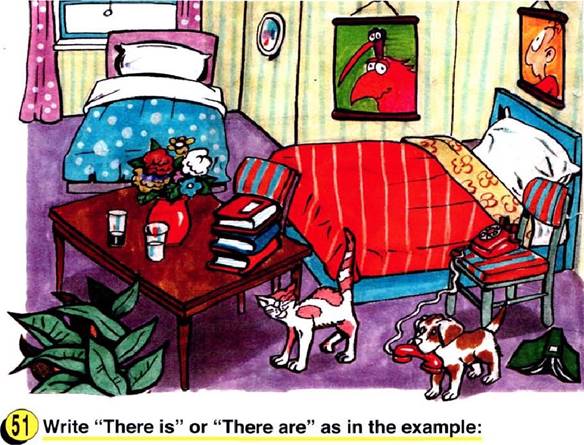
![]() four books in the bedroom. two chairs
in the bedroom. a dog in the bedroom. a cat in the bedroom. two glasses on the
table.
four books in the bedroom. two chairs
in the bedroom. a dog in the bedroom. a cat in the bedroom. two glasses on the
table.
1
52 Fill in "some" or "any".
![]() Are there any
Are there any ![]() eggs in the fridge?
eggs in the fridge?
2. Is there ![]() cake left?
cake left?
3. I have got ![]() pictures to show you.
pictures to show you.
4. Let's have ![]() ice-cream.
ice-cream.
5. Is there ![]() bread on the table?
bread on the table?
6. Let's buy ![]() cheese from the supermarket.
cheese from the supermarket.
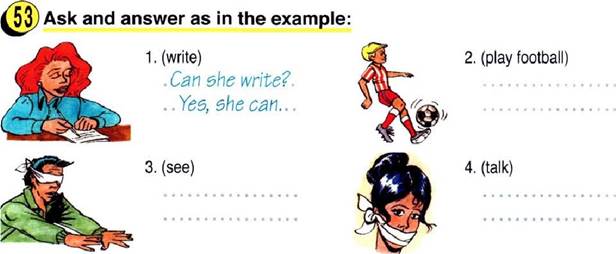

![]()
Usually Today

![]()
|
|
|
We use Simple Present for permanent actions.
![]()
|
Verbs ending in ss, sh, ch, x, o |
es |
Verbs ending in consonant + y ies |
|
I wash - he washes |
I go - he goes |
I cry - he cries BUT I play - he plays |
Ime Exþressions withSimþ e Presen
|
Once a week |
Every morning |
Always |
Never |
|
Twice a week |
Every year |
Sometimes |
At noon |
|
Every day |
Usually |
Seldom |
In the evening etc. |
55 Write the third person singular.
|
1. I cook - He . cooks, |
4, They
fly - It |
7. You like - He |
|
2. We
study - He |
5. I read - She |
8. I do - She |
|
3, You teach - She |
6, I buy - He |
9. We walk - He |
56 Complete the sentences as in the example:
![]()
|
1. She |
does not |
speak Italian. |
She |
doesn't |
speak Italian. |
|
2. They |
|
go to school. |
They |
|
to school. |
![]()
![]() go swim very well
go swim very well![]() We
We![]() swim very well, watch TV every day.
swim very well, watch TV every day.![]() watch TV every day,
watch TV every day,
5. You![]() live in England, You
live in England, You![]() live in England.
live in England.
57 Write what these people "do" or "don't do".

listen to the
study hard ride a bicycle swim very well radio

You
1. Penny studies hard and swims very well but she doesn't
ride a bicycle or listen ![]() to the radio..
to the radio..![]()
2. Bob![]()
![]()
3. Don and Alice![]()
![]()
![]()
58 Fill in the blanks with the verbs from the box below:
be - love - clean - have - meet - go - sleep - teach - learn - come
Mary
(1)![]() a teacher. She (2)
a teacher. She (2) ![]() French. The children
French. The children
(3)![]() her and they (4)
her and they (4) ![]() a lot from her. Mary
a lot from her. Mary
![]() (5) home
at 3:00 and (6)
(5) home
at 3:00 and (6)![]() lunch. Then she
lunch. Then she
for an hour.
In the afternoon she (8)![]() shopping or she her house. Sometimes she (10)
shopping or she her house. Sometimes she (10)![]() her aunt and
her aunt and
(11) tea
with her. Every Sunday she (12)![]() her friends.
her friends.
![]() l/
we l / we
l/
we l / we
Yes, they do. No, they don't.
he / she he / she he / she
![]() it work? Yes, it does. No, it doesn't.
it work? Yes, it does. No, it doesn't.
59 Complete the questions, then answer them as in the example:
1 . the
girls like football? No they don't.![]()
2.
Jim eat
beefburgers? Yes![]()
3.
you go to school?
Yes,![]()
4.
![]() she drink lemonade? No,
she drink lemonade? No,![]()
5.
![]() he help his mother? No,
he help his mother? No,![]()
6.
they walk to
school? Yes,![]()
7.
![]() fish live in the water? Yes,
fish live in the water? Yes,![]()
8.
![]() your dog sleep in your bedroom? No,
your dog sleep in your bedroom? No,![]()
9.
![]() you like bananas? No,
you like bananas? No,![]()
10, ![]() Ann and Mary visit their
grandparents? Yes,
Ann and Mary visit their
grandparents? Yes,![]()
60 Write sentences as in the example:
1. Beth eats oranges. (bananas) She
doesn't eat bananas.![]()
2. Paul likes walking. (running)![]()
3. They usually go to a disco.
(restaurant)![]()
4. Peter works in his office, (bedroom)![]()
5. They drink wateL (Coca-Cola)![]()
![]() It's Friday afternoon. Mrs West is
cleaning the house. She always cleans the house on
It's Friday afternoon. Mrs West is
cleaning the house. She always cleans the house on
Friday afternoon.
61 Match the adverbs with the time expressions.
![]()
always usually often sometimes seldom never
1. every morning
2. once a year
3. every day
4. not at all
5. once a month
6. once every 10 years
7. twice a week
8. every Sunday
62 Write what they usually do and what they're doing today. Usually Today
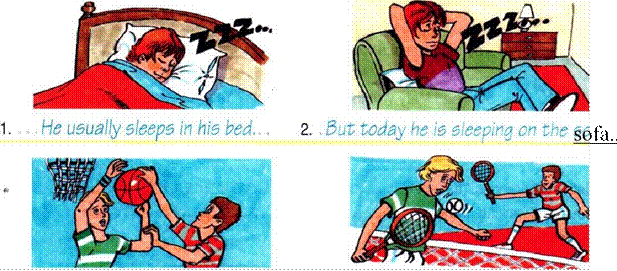
3. 4.
![]()


63 First write about Liz then about yourself.
always usually often sometimes seldom never Liz You Liz You Liz You Liz You Liz You Liz You
![]() . Liz often washes her hair, She
usually helps her mother. She
. Liz often washes her hair, She
usually helps her mother. She![]()
![]()
![]()
![]()
![]()
![]()
64
![]() Put the
verbs in brackets into the Simple Present or Present Cont. is (be) Sunday.
Put the
verbs in brackets into the Simple Present or Present Cont. is (be) Sunday.
(ride)
(wear)
(write) a
(send)
(want) to be a doctor. Sometimes my mother
![]() (ask) me what I (10). (want)
to be, but I (11) (not/know),
(ask) me what I (10). (want)
to be, but I (11) (not/know),
65 You sent a letter to Paula. This is her reply. Write the questions you asked her.
114, Ork Lane, Harrow, ![]()
Middlesex.
13th March, 2003.
![]()
Thanks for your letter. I work in a "hool. I am a
I live in a big my and
![]()
have one siøter, She is fiaeen yeare old, I have also got a pet dog. Its name is Benny.
![]() I like reading and 1 like the cinema.
I like music a lot. My favourite pop star is Kylie. Yours, Paula
Please write soon.
I like reading and 1 like the cinema.
I like music a lot. My favourite pop star is Kylie. Yours, Paula
Please write soon.
![]() Where ao you work?
Where ao you work?![]()
2.
3![]()
4.
5, ![]()
6.![]()
7. ![]()
8. ![]() 9.
9. ![]() 1 0.
1 0.![]()
66 Put the verbs into the Simple Present or Present Continuous.
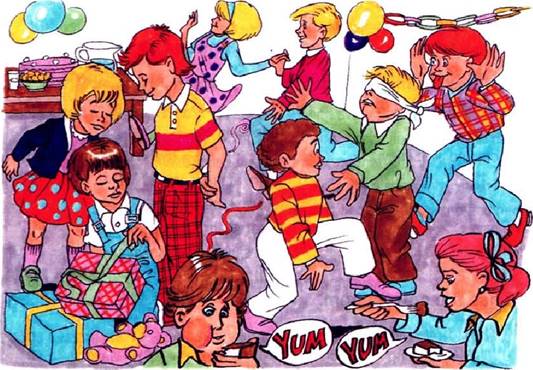
It (1)
. is (be) Saturday afternoon and my sister and I (2) ![]() (be) at my friend's party.
Some children (3) (dance) in the sitting-room now. My friend
(be) at my friend's party.
Some children (3) (dance) in the sitting-room now. My friend
![]() (open) a present at the moment. Two
children (5)
(open) a present at the moment. Two
children (5) ![]() (eat) chocolate cake, and three children (6) (play) a game.
I often
(eat) chocolate cake, and three children (6) (play) a game.
I often
![]() (go) to parties because I (8) (have)
a lot of friends. But I (9) (not]go) to parties on Sundays because I always
(go) to parties because I (8) (have)
a lot of friends. But I (9) (not]go) to parties on Sundays because I always
(10) (visit) my grandparents on Sundays.
67 Choose a time expression from the box for each sentence.
now - on Fridays - always - at the moment - every night
1 My father is listening to the radio at
the moment, .![]()
![]() have toast for breakfast.
have toast for breakfast.
3, We
watch the 9 0'clock news![]()
4. My brother is doing his homework![]()
5. My mother goes to the supermarket![]()
6. I read a book or a magazine in bed![]()
7. My grandmother ![]() sends me a birthday present.
sends me a birthday present.
8. My brother is playing football![]()
9. At school we have our history lesson![]()
10.My father ![]() buys a newspaper from the shop near
his office.
buys a newspaper from the shop near
his office.
68 Put the verbs into the Present Continuous or Simple Present.
1. Listen! The birds are singing (sing) in the garden!
2. I often ![]() (buy) fruit from the greengrocer's.
(buy) fruit from the greengrocer's.
3. My mother ![]() (drink) tea now.
(drink) tea now.
4, Look
at Tom and Jim! They ![]() (walk) up the hill.
(walk) up the hill.
5.
That man![]() (laugh) at the moment.
(laugh) at the moment.
6, The
cat![]() (play) with a ball now,
(play) with a ball now,
7. We always![]() (wear) warm clothes in winter.
(wear) warm clothes in winter.
8. He often![]() (eat) a sandwich at lunchtime.
(eat) a sandwich at lunchtime.
69 Choose the correct item.
1. She drinks , milk every morning.
A) drinks B) is drinking C) drink
2. We ![]() to the park now,
to the park now,
|
A) goes |
B) are going |
|
|
3. The woman |
|
swimming now. |
|
A) goes |
B) is going |
C) go |
4. She
often![]() her red dress.
her red dress.
|
|
|
6.
John ![]() to school now. A) walks B) is walking C) walk
to school now. A) walks B) is walking C) walk
7, My
cat usually ![]() by the fire. A) sleep B) is sleeping C) sleeps
by the fire. A) sleep B) is sleeping C) sleeps
![]() a letter at the
moment. A) write B) am writing C) is writing
a letter at the
moment. A) write B) am writing C) is writing
9.
They![]() In
In ![]() a restaurant every Sunday. A) eats
B) are eating C) eat
a restaurant every Sunday. A) eats
B) are eating C) eat
10.
Mother always![]() the grass. A) cuts B) cut C) is
cutting
the grass. A) cuts B) cut C) is
cutting
70 Put the verbs into the Simple Present or Present Continuous.
It's Sunday at Ann's house.
Helen, Where (1) (be) David?
Ann. He (2) (clean) his bicycle. He usually (3) ![]() (play) basketball on Sundays, but
today he (4)
(play) basketball on Sundays, but
today he (4) ![]() (not/want) to play basketball.
(not/want) to play basketball.
Helen: ![]() (be) your father in the garden now?
(be) your father in the garden now?![]()
Ann:
Yes, he (6) ![]() (cut) the grass. He (7)
(cut) the grass. He (7) ![]() (not/like) long grass. He often (8)
(not/like) long grass. He often (8) ![]() (say) that he (9)
(say) that he (9) ![]() (want) a perfect garden! I usually (i O) (help) him,
but now I
(want) a perfect garden! I usually (i O) (help) him,
but now I
(11) ![]() (learn) some French verbs.
(learn) some French verbs.
Helen: Why?
Ann: Because I (12) ![]() (not/know) them and we always
(not/know) them and we always
(13) ![]() (have) a test on Monday morning!
(have) a test on Monday morning!
71 Put the verbs into the Simple Present or Present Continuous.
Sarah usually (1) . goes (go) swimming every Saturday but this Saturday it
![]() (be) her birthday. She (3) (like)
chocolate cake so her sister (4)
(be) her birthday. She (3) (like)
chocolate cake so her sister (4) ![]() (make) one for her now. Her mother (5)
(make) one for her now. Her mother (5) ![]() (cook) food at the moment and her
father (6)
(cook) food at the moment and her
father (6) ![]() (do) the shopping. Sarah
(do) the shopping. Sarah
(want) everything to be nice for her party. Now she and her brother
![]() (make) hats for the children. They
always (9)
(make) hats for the children. They
always (9)![]() (have) a good time at parties. They (10) (sing) and (11)
(have) a good time at parties. They (10) (sing) and (11)![]() (dance) a lot and (12) (play) their
favourite games.
(dance) a lot and (12) (play) their
favourite games.
Your teacher divides the class into two groups and chooses a leader. Your teacher whispers into the leader's ear what he/she often does (e.g. Teacher: "l often drive a car."). The groups in turn try to guess what the teacher often does by asking the leader questions.
Group A Sl : Does he often play tennis? Leader: No, he doesn't.
Leader: No, he doesn't. Group A S2: Does he often drive a car? Group B Sl : Does he often play the guitar? Leader: Yes, he does. Group A gets 1 point. The group with the most points is the winner.
![]()

We use the Imperative when we tell one or more persons to do something.
7 Match the following with the pictures:
Open the window, please! Drink your milk! Sit down, please!
Let's go into the shop! Let's play in the garden! Be quiet, please!
Please don't walk on the grass! Don't wake up the baby! Don't smoke in your bedroom!
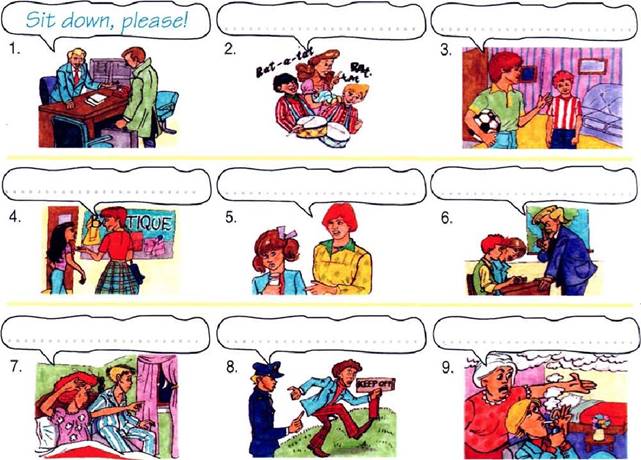
![]() Place
Place

![]() The old man is sitting beside the old
woman. The young woman is sitting opposite them. They are all sitting by the
fireplace. There is a picture above the fireplace and a vase with flowers below
the picture. There is a pram behind the woman. The pram is in front of the man.
He is lifting the baby up. A young man is coming through the door-way into the
living-room. There is a small table in the room and on the table there is a
goldfish bowl. There is a goldfish in the bowl. A cat is near the bowl. The cat
is putting its paw into the bowl. He is trying to take the fish out Of the
bowl. A little girl is going up the stairs and a dog is coming down the stairs.
A boy is sitting at his desk. He is doing his homework.
The old man is sitting beside the old
woman. The young woman is sitting opposite them. They are all sitting by the
fireplace. There is a picture above the fireplace and a vase with flowers below
the picture. There is a pram behind the woman. The pram is in front of the man.
He is lifting the baby up. A young man is coming through the door-way into the
living-room. There is a small table in the room and on the table there is a
goldfish bowl. There is a goldfish in the bowl. A cat is near the bowl. The cat
is putting its paw into the bowl. He is trying to take the fish out Of the
bowl. A little girl is going up the stairs and a dog is coming down the stairs.
A boy is sitting at his desk. He is doing his homework.
1. Where is the old man sitting? Beside
the old woman,![]()
2. Where is the young woman sitting?![]()
3. Where are they all sitting?![]()
4. Where is the picture?![]()
5. Where is the vase?![]()
6. Where is the pram?![]()
7. Where is the man?![]()
8. What is the man doing with the baby?![]()
9. Where is the young man going?![]()
10.Where is the goldfish?![]()
11.Where is the cat?![]()
12.Where is the cat putting its paw?![]()
13,
What is the cat trying to do?![]()
14,
Where is the dog going?![]()
15. Where is the little girl going?![]()
16. Where is the boy sitting?![]()
74 and read the text. Then cover the text
![]()
and try to answer the questions that follow it.
![]() There is a
boy between the two girls. There is a cat under the tree and a bird is flying
over the cat's head. There are some birds among the leaves of the trees. A
cyclist is going along the street and an old man is walking across the street.
There is a
boy between the two girls. There is a cat under the tree and a bird is flying
over the cat's head. There are some birds among the leaves of the trees. A
cyclist is going along the street and an old man is walking across the street.
1. Where is the boy? Between the
two girls.![]()
2 Where is the cat?![]()
3, Where is the bird?![]()
4.
Where
are the birds?![]()
5.
Where
is the cyclist going? ![]() 6. Where is the old man walking?
6. Where is the old man walking?![]()
75 Look at the picture and fill in: 'in" "beside", "behind", "into", "out of", "under", "in front of" or "on".
![]() the
the
the
the
8) ![]() the pool.
the pool.
![]() Place
Place
76 ![]() and fill in: "across",
"along", "in front of", "near", "out
of", "opposite" or "between".
and fill in: "across",
"along", "in front of", "near", "out
of", "opposite" or "between".
![]() There are
some cars parked
There are
some cars parked
two the
standing 7) the car.
77 Look at the pictures and fill in:
"through", "on", "above", "in" ![]() "beside", "over"
or "into"
"beside", "over"
or "into"![]()
![]() Sam is
sick and he is lying the bed and
Sam is
sick and he is lying the bed and
Sam's bed.
his mouth because he is coughing. A nurse is coming 7) ![]() the door 8)
the door 8)![]() the room. It's time for Tom and Sue
to leave.
the room. It's time for Tom and Sue
to leave.
8. Place
78 and fill in: "above", "behind", "over' "on" "under", "at", "out of", "near" or "down".
![]() a
a
his
the door
the
the floor the
chair and his books are 9) the bed. The poster 10)![]() his bed is falling 11)
his bed is falling 11) ![]() His socks are hanging 12) the
drawer. His room is a mess and his mother is very angry.
His socks are hanging 12) the
drawer. His room is a mess and his mother is very angry.
Look at the picture of the living-room in exercise 73 page 49.
Your teacher will ask a student to come to the front of the class. He/ she will be the leader of the game. The leader must put the cat somewhere in the living-room, (e.g. The cat is under the table). Then the teacher divides the class into two groups. The groups ask the leader questions in turn until they find the cat. The winning group is the one which finds out where the cat is.
|
Group A Sl . |
Is the cat on the sofa? |
|
Leader: |
No, it isn't, |
|
Group B Sl : |
Is the cat behind the sofa? |
|
Leader. |
No, it isn't. |
|
Group A S2: |
Is the cat under the table? |
|
Leader: |
Yes, it is. |
Group A wins. Now the teacher can choose another leader and you can play the game again.
![]()
In the evening At noon On Friday

|
He does his homework |
They have lunch |
She goes shopping |
|
in the evening. |
together at noon. |
on Friday. |
![]()
|
|
|
1. . on Saturday.9 0'clock.
2.
![]() July. Christmas.
July. Christmas.
3.
![]() 1 984. September 28th. 4,
1 984. September 28th. 4, ![]() March 25th, 1991.
March 25th, 1991.
5.
![]() Friday. August 29th.
Friday. August 29th.
6.
![]() summer. Thursday
afternoon.
summer. Thursday
afternoon. ![]() the morning, the evening.
the morning, the evening.
Fill
in "at in" or "on'![]() as in the example:
as in the example:
1.
![]() . in Decemty 6. a
quarter past six.
. in Decemty 6. a
quarter past six.
2.
midnight. noon.![]()
3. Wednesday evening.1982.
4. April.spring.
5. April 2nd,night.
on Sundays on Monday ![]() on Tuesday (days) etc
on Tuesday (days) etc ![]() on October 4th (dates) on Sunday afternoon
on October 4th (dates) on Sunday afternoon
![]() autumn. half past two.
autumn. half past two.
Monday morning.
Easter,
10 0'clock.
winter. noon.
![]() February 8th.
February 8th.
Saturday night. 1964.
Monday.
June 26th.
81 Fill in the blanks with "in", "at" or
"on" as in the example:![]()
I . We
always go on holiday . .in.![]() summer.
summer.
2. My parents usually go shopping![]() Saturday morning.
Saturday morning.
3. I always do my homework![]() the evening.
the evening.
4. The circus usually comes to our town![]() spring.
spring.
5. Sophia's birthday is ![]() May 16th.
May 16th.
6, I
usually get up ![]() seven o'clock.
seven o'clock.
7. My favourite television programme
begins![]() 6:30 the evening.
6:30 the evening.
8. Sometimes it snows ![]() winter.
winter.
9. My friend's birthday is ![]() June.
June.
10. Some birds and animals come out![]() night.
night.
82 Choose the correct answer.
![]()
1. ![]() My lesson starts . at . five o'clock. 5.
I usually visit my grandparents
My lesson starts . at . five o'clock. 5.
I usually visit my grandparents![]()
A) on![]() Sunday afternoon,
Sunday afternoon,
2. My brother usually buys a newspaper A)
on ![]()
![]() the morning. 6. John's
birthday is
the morning. 6. John's
birthday is![]() August 16th.
August 16th.
A) on![]() A) on
A) on ![]()
3. We wear warm clothes winter. 7. The
film finishes![]() 9:30
9:30![]()
A) on![]() A) on
A) on ![]() C) in
C) in
4. We get presents Christmas. 8. The
supermarket is closed![]() Sunday' A) on
Sunday' A) on![]() A) on
A) on ![]() C) in
C) in
Your teacher will divide the class into two groups. Then he / she will say expressions of time without their prepositions. The groups in turn should complete the missing prepositions. Each correct answer gets one point. The group with the most points wins.
![]() Teacher: the
afternoon Group A S2:
Teacher: the
afternoon Group A S2: ![]() in 1992
in 1992
Group A Si. in the afternoonTeacher: Christmas
Teacher: nightGroup B S2: in Christmas
Group B![]() at night Teacher: Wrong!
at Christmas.
at night Teacher: Wrong!
at Christmas.
Teacher: 1992Group B gets no point.
|
|
|
|
|
|
|
How much / How many |
![]()

83 Write the words from the box in the correct column.
bread lemon water woman cheese sugar meat Coke coffee room bottle boy money table dog glass girl tea car milk
Uncountable Countable ![]() bread
bread ![]() . bottle
. bottle![]()
![]()
![]()
![]()
![]()
84 Write questions as in the example :
1.
sugar? How much
sugar have you got?.![]()
2.
dresses?![]()
3.
lemonade?![]()
4.
oranges?![]()
5.
meat?![]()
6.
chairs?![]()
7.
glasses?![]()
8.
cheese?![]()
9.
cats
?![]()
10.
shirts?![]()
11.
jam?![]()
12.
books?![]()
85 Ask and answer as in the example:



![]()



87 Ask and answer as in the examples:
![]() How much
How much![]() sugar is there? .1
kilo.
sugar is there? .1
kilo.![]()
2.
How many.![]() oranges are there? 3 oranges.
oranges are there? 3 oranges.![]()
3.
![]() bread is there?
bread is there?![]()
4.
![]() meat is there?
meat is there?![]()
5.
![]() bananas are there?
bananas are there?![]()
6.
![]() coffee is there?
coffee is there?![]()
7.
![]() tomatoes are there?
tomatoes are there?![]()
8.
![]() biscuits are there?
biscuits are there?![]()
9.
![]() milk is there?
milk is there?![]()
10.
![]() potatoes are there?
potatoes are there?![]()
The teacher divides the class into two groups. Then he / she says nouns and the groups in turn add "how much" or "how many". Each correct answer gets 1 point. The group with the most points is the winner.
![]() Teacher : cheeseTeacher
: water
Teacher : cheeseTeacher
: water
Group A ![]() : how much cheese? Group
A S2
: how much cheese? Group
A S2![]() how many water?
how many water?
Teacher
. eggsTeacher . Wrong! "How much water?" Group B ![]() how many eggs? Group A gets no
point.
how many eggs? Group A gets no
point.
![]()
88 Fill in the blanks putting the verbs into their correct form:
read go play eat want come be like work
John
(1) works . in a bank. He (2) ![]() his job because it (3)
his job because it (3) ![]() very interesting. Many people (4) to the bank when they (5) money. When
he
very interesting. Many people (4) to the bank when they (5) money. When
he ![]() home at night he (7) his dinner and (8)
home at night he (7) his dinner and (8) ![]() with his two children. Before they
(9)
with his two children. Before they
(9) ![]() to bed he (10)
to bed he (10) ![]() them a story,
them a story,
89 Fill in the blanks with one of the words from the box below:
at the moment usually seldom never
1 . 1 .
never. . ![]() go to school on Christmas Day.
go to school on Christmas Day.
2. I am writing a letter eat meat; I don't like it very much. go to church on Sundays.
90 Put the verbs into the Simple Present or Present Continuous.
1. The children . are playing . (play) outside now.
2 He sometimes (go) to church.
(do) my homework at the moment.
(read) the newspaper every morning. (eat) my dinner now.
Revision Exercises W
6.
She usually ![]() (read) a book in the evening.
(read) a book in the evening.
7.
We![]() (go) to the disco tonight.
(go) to the disco tonight.
![]() (write) a letter to his penfriend
every month.
(write) a letter to his penfriend
every month.
9.
My mother usually
![]() (cook) dinner in the evening.
(cook) dinner in the evening.
10.
She ![]() (travel) to work by train every day.
(travel) to work by train every day.
91 Choose the correct item.
1, She . eats, . meat every day, 5. Mother never the dishes.
A) is eating B) eats C) eat A) is washing B) washes C) wash
2. The baby at the moment. 6. Jane a book at the moment. A) is sleeping B) sleeps C) sleep A) is reading B) reads C) read
![]() to bed every night at 10.00 pm 7.
She very quickly, Look!
to bed every night at 10.00 pm 7.
She very quickly, Look!
A) am going B) goes C) go A) is running B) runs C) run
4. Mum TV now. my homework every day.
A) is watching B) watches C) watch A) am doing B) do C) does
|
92 Fill in "in |
|
1.
![]() I usually
go to the park
I usually
go to the park![]() Sundays. 6. Are you going to the disco
Sundays. 6. Are you going to the disco![]() Saturday?
Saturday?
2.
We go skiing![]() Decemty 7. We learn many things
Decemty 7. We learn many things![]() school.
school.
3.
I am going to
Spain![]() summer. 8. I dont like getting up
summer. 8. I dont like getting up![]() the morning.
the morning.
4.
We don't go to
school![]() Easter. 9. I am going to the dentist
Easter. 9. I am going to the dentist![]()
5.
I got up 8.00
am this morning. 10. I go to bed ![]() 10 0'clock.
10 0'clock.
93 Fill in the third person singular.
1. ![]() I write - He 4. I buy- He
I write - He 4. I buy- He![]()
2. I catch - He 5. I give -
He![]()
3. I cry - He 6. I kiss - He![]()
![]() Fill in "How much" or
"How many".
Fill in "How much" or
"How many".
![]() . How many apples are there in the
bag?
. How many apples are there in the
bag?
2.
![]() money have you got?
money have you got?
3.
![]() girls are there in your class?
girls are there in your class?
4.
![]() milk is there?
milk is there?
5.
![]() records have you got?
records have you got?
7. I dance - He![]()
8. I take - He![]()
9. I go - He![]()
butter do you want? people can you see? sugar do you want? children can you see? meat do you want?
95 Fill in the correct preposition.
under between behind out of at on in into
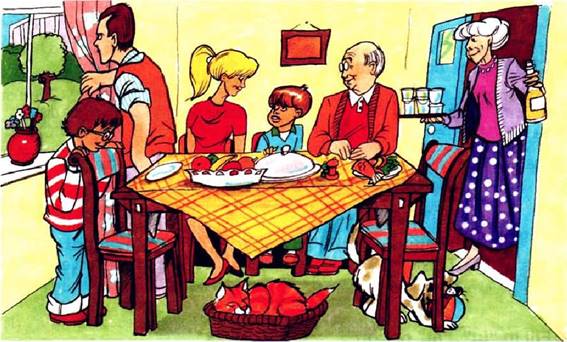
The cat is sleeping 1) ![]() . in
. in![]() its basket. Dinner is 2)
its basket. Dinner is 2)![]() the table. Grandfather is sitting 3)
the table. Grandfather is sitting 3)![]() the table. Peter is sitting 4)
the table. Peter is sitting 4)![]() Sally and Grandfather. Father is
looking 5)
Sally and Grandfather. Father is
looking 5)![]() the window.The dog is playing with a ball 6)
the window.The dog is playing with a ball 6) ![]() the chair. John is 7)
the chair. John is 7)![]() the chair. Grandmother is coming 8) the
room with some lemonade.
the chair. Grandmother is coming 8) the
room with some lemonade.
96 Underline the correct word as in the example:
1. Tina is (my, mine) sister,
2. This car is (her, his).
3. These are the children's shoes. They're (their, theirs),
4. These books are (your, yours).
5 That skirt is (her, hers).
6. (My, Mine) brother is tall.
7. This is Sue's bicycle. It's (her, hers) bicycle.
8. That is (your, yours) pen.
9. These are (our, ours) pencils.
10. This shirt is (her, his).
Revñsñon Exercises Il
97 Put the verbs in brackets into the Simple Present or Present Continuous.
![]() (be)
Friday evening and my
(be)
Friday evening and my
(be) at the
(dance)
(sit) down and
(drink) Coke. My
(talk) and
(laugh) together. We (go) to the disco every
|
week. We usually (9) 98 Change to the plural. |
(drink) Coke and (10) |
(dance). |
|
I . She has got a child. |
They
have got children, |
|
2. This is my car. ![]()
3. It is an ox. ![]()
4. That is a fox. ![]()
5. He is a singer. ![]()
99
Fill in
"some" or "any"![]()
|
1. Is there |
any |
milk in the bottle? |
|
2, There are |
|
biscuits in the tin. |
|
3, There aren't |
|
pens on the desk. |
|
4. There are |
|
flowers in the vase. |
|
5. Are there |
|
cups in the cupboard? |
|
6, There isn't |
|
cheese in the fridge. |
100 Fill in "There is" or "There are".
|
1. . There are , |
|
some bottles of Coke on the table. |
|
2. |
|
some milk in the fridge. |
|
3.
|
|
a man at the door. |
|
4. |
|
zebras in the zoo. |
|
5. |
|
a box on the table. |
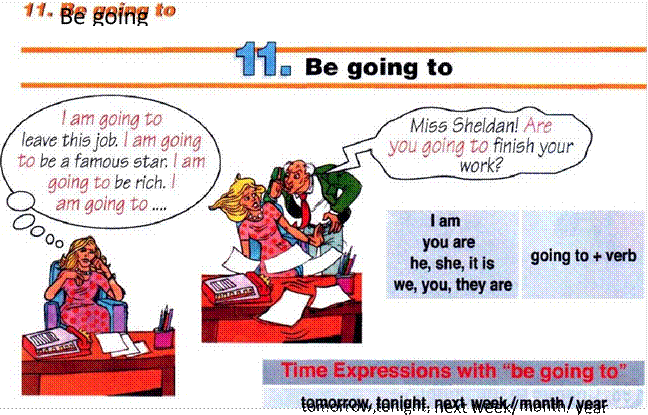
We use "be going to" for plans and intentions or when there is evidence that something is going to happen in the future.
10 Write sentences as in the example:

![]() 1. (play/tennis) I warn going to
1. (play/tennis) I warn going to![]() 2. (fight) They
2. (fight) They ![]() . play tennis,
. play tennis,
3,
(sleep) We![]() 4. (wash/the dishes) He
4. (wash/the dishes) He![]()
![]()

5. (open/his umbrella) He![]() 6.
(post/ a letter) He
6.
(post/ a letter) He![]()

7. (feed/the dog) He![]() 8.
(cut/some bread)She
8.
(cut/some bread)She![]()
![]()
102 Complete the sentences as in the example:
![]()
![]()
![]() 1.
(dig/in the garden) 2. They are.
1.
(dig/in the garden) 2. They are. ![]() They
are. digging in the.
They
are. digging in the. ![]() going to dig. gardens..
going to dig. gardens.. ![]() in
the garden..
in
the garden..



103 Write questions and answers as in the example:

football
teacher doctor singer
player

1.
Fred
/ singer? 15 Fred going to be a singer?![]()
![]() No,
he isn't, He isn't going to be a singer.
No,
he isn't, He isn't going to be a singer. ![]()
![]() He
is going to be a doctor.
He
is going to be a doctor.![]()
2.
Rod
and Ben / teachers?![]()
![]()
![]()
3.
Joan
/ doctor?![]()
![]()
![]()
4.
Ted
/ singer?![]()
![]()
![]()
5, You / teacher?![]()
![]()
![]()
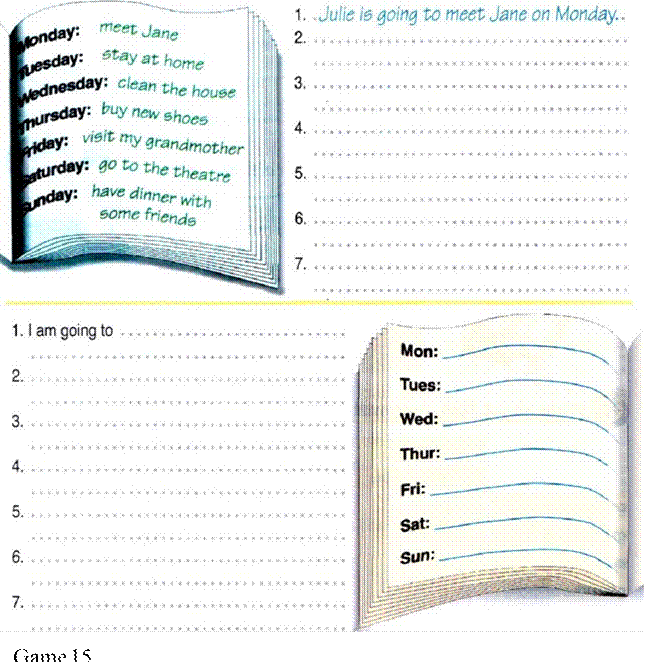
The teacher divides the class into two groups and chooses a leader. The leader thinks of five things he / she is going to do tomorrow. The groups in turn ask questions. Each correct guess gets 1 point. The group with the most correct guesses is the winner.
(List : dance - go shopping - do homework - go to the cinema - visit my friend).
Group A SI : Are you going to read? Leader . Yes, I am.
Leader No, I'm not. Group A S2 : Are you going to do your homework?
Group B Sl : Are you going shopping? Leader . Yes, I am, etc.
![]() 2
2
![]()
doing something
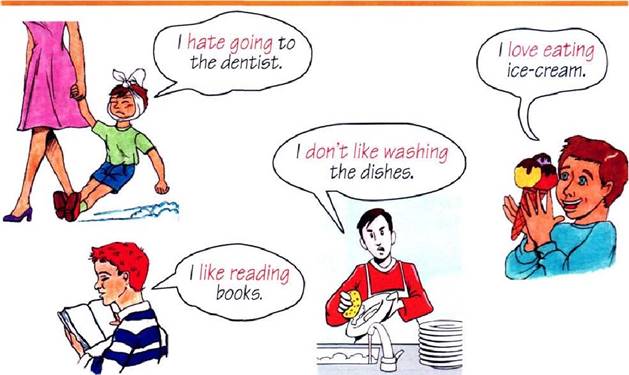
105 Write about Tom, then write about you.
like don't like love hate
Tom You Tom You Tom You Tom You go on holiday get up early clean room go to the doctors read stories
1. Tom . likes going on holiday,![]()
2.![]()
3.![]()
![]() 4.
5.
4.
5.

![]() Z
Z
![]()
9. ![]() 10.
10.![]()
![]() Sally and her family love
Sally and her family love ![]() . going .(go) to the park in the
summer, They like
. going .(go) to the park in the
summer, They like
![]() (have) picnics and love
(have) picnics and love
![]() (sit) on the grass. Sally's mother
hates (3)
(sit) on the grass. Sally's mother
hates (3) ![]() (make) sandwiches so her father always makes them. Sally and her brother
love
(make) sandwiches so her father always makes them. Sally and her brother
love
![]() (play) with a ball in the park. Sally's mother likes (5)
(play) with a ball in the park. Sally's mother likes (5) ![]() (lie) on the blanket and loves (6)
(read) her favourite magazines. Sally loves (7)
(lie) on the blanket and loves (6)
(read) her favourite magazines. Sally loves (7) ![]() (listen) to the birds singing in the trees and her
brother likes (8)
(listen) to the birds singing in the trees and her
brother likes (8) ![]() (watch) the people in the park. Sally's family likes the park because
they love (9)
(watch) the people in the park. Sally's family likes the park because
they love (9) ![]() (be) outdoors.
(be) outdoors.
107 Write questions and answers as in the example:

1. the girls / eat chocolate. 2. Polly / touch spiders.
(like) . Do the girls like eating
chocolate? (like)![]()
(Yes, love) Yes, they love eating chocolate. (No, hate)
12

3. the dog / have a bath.
(like)![]()
![]()

5. Tom / do his homework.
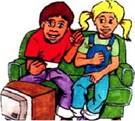
4. the children (watch TV.
(like)![]()

6. Sam / get up early.
(like)![]() (like)
(like)![]()
(No, not like) (No, hate)

7, the children / go to the circus. 8. the baby / take medicine.
(like)![]() (like)
(like)![]()
(Yes, like) (No, hate)
![]()

9. Father / clean the car. 10. they / eat meat.
(like)![]() (like)
(like)![]()
(No,
not like)![]() (Yes, like)
(Yes, like)![]()
108 Complete the sentences as in the example:


You
1.
Jane
. like; riding a bicycle and swimming. She doesn't like watching ![]()
![]() T'/
or flaying football.
T'/
or flaying football.![]()
2.
Mike![]()
![]()
3, Rod and Ben![]()
![]()
4. Jennifer![]()
![]()
![]()
The teacher divides the class into two groups. Each group makes up sentences in turn. One student from group A starts saying what he/she likes. The next student from group B says what the previous student likes and adds what he/she likes and so on. Each correct sentence gets 1 point. The group with the most points is the winner.
|
Example : |
Group ASI • |
I like fishing. |
|
|
Group BSI . |
I like fishing and reading, |
|
|
Group A S2 : |
I like fishing, reading and dancing. |
|
|
Group BS2 • |
I like fishing, reading, dancing and singing. |
|
|
Group A S3 . |
(silence) |
Group A gets no point.

Must expresses obligation or necessity. Mustn't expresses prohibition.
Mr Welsh has got a cold and is coughing a lot. The doctor is telling him what he must or mustn't do.
![]() You 1) must.. stay in bed. You go to
work. You 3)
You 1) must.. stay in bed. You go to
work. You 3) ![]()
![]() eat soup. drink cold drinks. You drink milk or hot tea. You eat
ice-cream. You stop smoking.
eat soup. drink cold drinks. You drink milk or hot tea. You eat
ice-cream. You stop smoking.
110 Mother is telling her son what he must or mustn't do.
![]() 1 . You must. do
your homework.
1 . You must. do
your homework.
2. You ![]() be late for school.
be late for school.
3. You ![]() talk in class.
talk in class.
4. You ![]() tidy your room.
tidy your room.
5. You ![]() go to bed late.
go to bed late.
6. You . ![]() get up early.
get up early.
11 Match the sentences with the pictures .
You mustn't smoke in here. You mustn't swim here. You must drive slowly. You mustn't walk on the grass. You mustn't park here. You must stop here.

1. You must drive slowly. 2. 3.

![]() 4. 5. 6
4. 5. 6
Mr Brown has problems with his heart. The doctor is telling him what he must or mustn't do.
![]() You 1) must . lose weight. You 2)
You 1) must . lose weight. You 2) ![]() eat sweets. You 3)
eat sweets. You 3) ![]() eat so much. You 4)
eat so much. You 4) ![]() eat vegetables. You 5)
eat vegetables. You 5) ![]() smoke. You 6)
smoke. You 6) ![]() work too hard. You 7)
work too hard. You 7) ![]() walk a lot. You 8)
walk a lot. You 8) ![]() take some exercise. You 9)
take some exercise. You 9) ![]() drink a lot of water. You 10)
drink a lot of water. You 10) ![]() go to bed early. You 11)
go to bed early. You 11) ![]() take some medicine. You 12)
take some medicine. You 12) ![]() go out in cold weather.
go out in cold weather.
Game 17
Your teacher will divide the class into two groups. Then he /she will say "must" or "mustn't" and the groups in turn make up sentences. Each correct sentence gets 1 point. The group with the most points is the winner.
![]() Teacher
Teacher![]() must Group
A S2
must Group
A S2![]() You mustn't be late.
You mustn't be late.
Group A Sl![]() You must drive carefully Teacher
: must
You must drive carefully Teacher
: must
Teacher![]() must Group
B S2
must Group
B S2![]() You must tell lies.
You must tell lies.
Group B Sl![]() You must be polite. Teacher
. Wrong! You must tell the truth, Teacher . mustntGroup B gets no
point.
You must be polite. Teacher
. Wrong! You must tell the truth, Teacher . mustntGroup B gets no
point.
![]()
|
|
|
|
|
|
|
Past Tense (Was —Were) |

We use past tense for actions which happened at a definite time in the past.
![]()
 yesterday last month two weeks ago
last week last year
yesterday last month two weeks ago
last week last year ![]() two months ago
two months ago![]() then etc.
then etc.
•14. (Was Were)
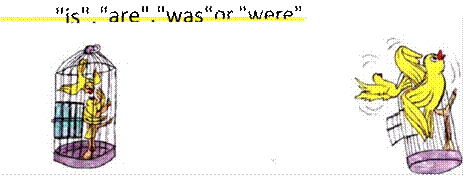
1. The birds are in the cage. The birds were . in the cage but they are out of the cage now.
![]()

2.
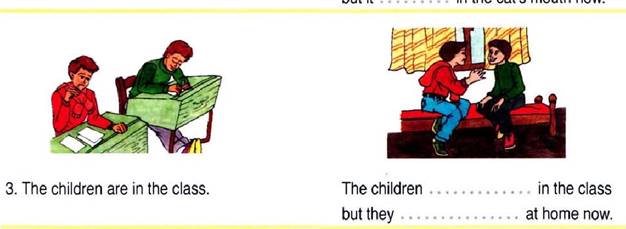

4.
The cat is on the chair. The cat![]() on the chair but it
on the chair but it![]() under the table now,
under the table now,
![]()
the blanks with "am", "is ' ', "are" 'was" or "were"

115 Look at ex. 114 then ask and answer questions as in the example:
i . Anna and Mary / at work / Sunday?
![]() Were Anna and Many at work on Sunday?
Were Anna and Many at work on Sunday?
![]()
![]() No, they weren't. They were at home,
No, they weren't. They were at home,![]()
2. the children / in bed I three hours ago?
![]()
![]()
3. she / in the kitchen / two hours ago?
![]()
![]()
4. the girls I at their grandmother's / last Saturday?
![]()
![]()
14. (Was Were)

117 Look at ex. 116 first. Then look at the picture and write what "there was/were" in the living-room.
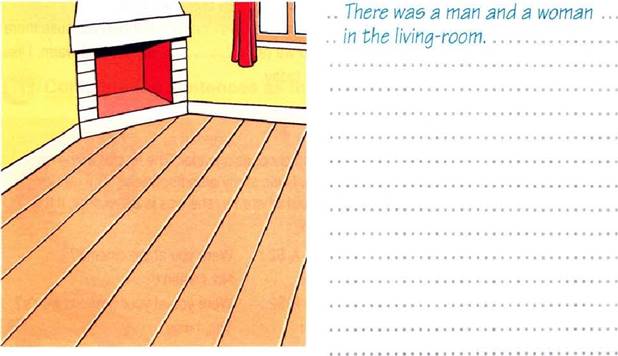
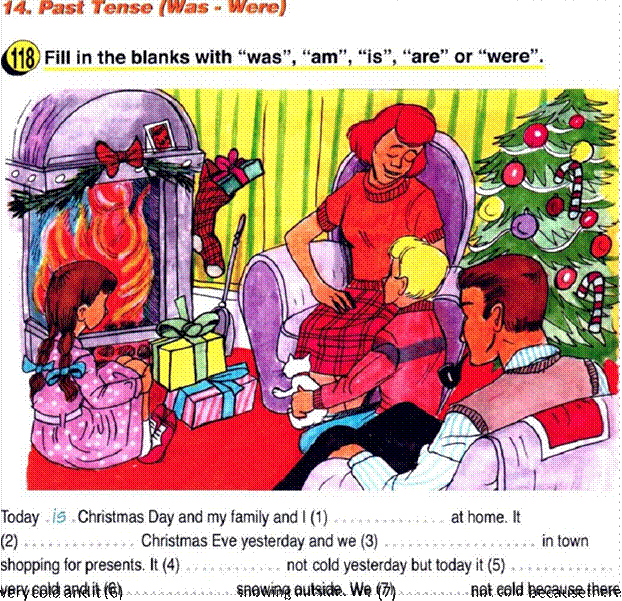
![]() a big fire in the living-room and we (9)
a big fire in the living-room and we (9) ![]() all nice and warm. I like
all nice and warm. I like
Christmas
and I (10) ![]() very happy today.
very happy today.
![]() Group A Sl : Were you at
home? Group A S2
Group A Sl : Were you at
home? Group A S2![]() Were you at the cinema?
Were you at the cinema?
Leader . No, I
wasn't. Leader![]() No, I wasn't.
No, I wasn't.
Group B Sl : Were
you at work? Group B S2![]() Were you at your grandmother's?
Were you at your grandmother's?
Leader![]() No, I wasnt. Leader
No, I wasnt. Leader![]() Yes, I was.
Yes, I was.
Group B is the winner. The teacher chooses another leader and you can play the game again.
|
You had |
|
You did not have |
You didnt have |
Did you have? |
|
He had |
|
He did not have |
He didnt have |
Did he have? |
|
She had |
|
She did not have |
She didn't have |
Did she have? |
|
It had |
|
It did not have |
It didn't
have |
Did it have? |
|
We had |
|
We did not have |
We didn't have |
Did we have? |
|
You had |
|
You did not have |
You didnt have |
Did you have? |
|
They had |
|
They did not have |
They have |
Did they have? |
![]()
![]()
![]()
![]()
![]()
![]()
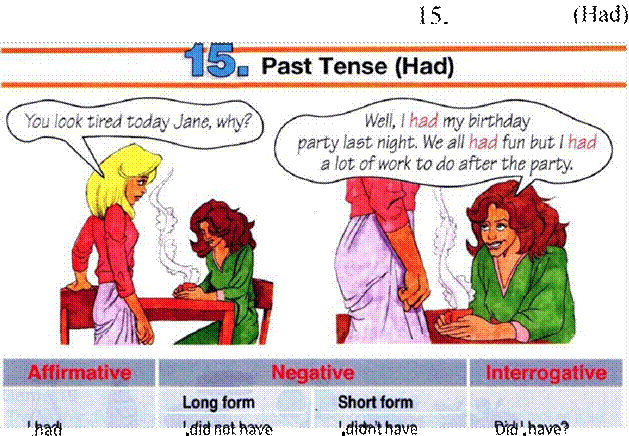 Long form Short
form
Long form Short
form
119 Complete the sentences as in the example:


![]() (Wad)
(Wad)

 7. (a
7. (a  vase)
vase)
120 They went on a picnic last Sunday. Write what each one of them had.

apples oranges pears sandwiches Coke milk
|
Jean Mike |
2 |
2 3 |
1 |
2 |
|
Don & Jim Helen |
2 3 |
2 |
3 |
|
|
1 3 |
|
2 |
1 |
Carol 1 2 2 2
1.
Jean . had three apples,
two pears, two sandwiches and one bottle of . . . ![]() .Coke. She didn't have any oranges or milk.
.
.Coke. She didn't have any oranges or milk.
.![]()
2.
Mike![]()
![]()
3.
Don
and Jim![]()
![]()
![]()
![]()
5. Carol![]()
![]()
Ill
![]() I / you / he / she / it l/
you / he/ she/ it
I / you / he / she / it l/
you / he/ she/ it![]()
![]()
Yes, we
/ you / they ![]() did. No' we/ you / they didn't.
did. No' we/ you / they didn't.
12 Look at ex. 120. Then ask and answer as in the example:
1 (Jean / milk?) . . Did Jean have any milk? No, she
didn't.![]()
2. (Jean / pears?)![]()
![]() 3 (Mike / oranges?)
3 (Mike / oranges?)![]()
4. (Mike / milk?)![]()
5. (Mike / apples?)![]()
6 (Don
and Jim / milk?)![]()
7. (Don and Jim I sandwiches?)![]()
8. (Carol / pears?)![]()
The teacher divides the class into two groups ahd chooses a leader. The leader makes a list of the things he /she had for breakfast. The groups in turn try to guess what he /she had for breakfastEach group can ask five questions, Each correct guess gets i point. The group which guesses most or all the things is the winner.
Leader: eggs, jam, toast, tomato juice, cake, eggs
![]() Group A Sl
Group A Sl![]() Did you have tea for breakfast? Leader
: Yes, I did.
Did you have tea for breakfast? Leader
: Yes, I did.
Leader![]() No, I didn't. Group A S2
No, I didn't. Group A S2![]() Did you have eggs for Group B SI : Did
you have toast for breakfast?breakfast?
Did you have eggs for Group B SI : Did
you have toast for breakfast?breakfast?
Leader . Yes, I did. etc,
![]()
Fill in "must" or 'mustn't".
1. He is late. He must . run to school![]()
2. He is sick. He ![]() go to school.
go to school.
3. She has a cold. She![]() take some medicine.
take some medicine.
4. Your hands are dirty. You![]() wash them.
wash them.
![]()
Fill in "How much" or "How many".
1. How much money have you got?
2.
![]() days are there in a week?
days are there in a week?
3.
![]() butter is there on the plate?
butter is there on the plate?
4.
![]() books have you got?
books have you got?
Complete the chart and then write sentences.
like don't like love hate
Your Your Your Your
You You You You
friend friend friend friend
Go to school Go to the dentist's
Cut the grass
Go to bed late
1. . . My friend doesn't like going to school. .![]()
2.![]()
3.![]()
4.![]()
5.
8.![]()
9. ![]() 10.
10.![]()
125 Change to the plural as in the example:

Ill
Match the sentences with the pictures as in the example:
You mustn't talk in the library. You mustn't eat or drink in the classroom. You must have a bath. You must brush your teeth after meals.
 .
You must brush your teeth. . Effer meals.. .
.
You must brush your teeth. . Effer meals.. .

3.![]() 4.
4.![]()
![]()
Ask and answer the questions as in the example:

1. Sam / in London / last week? 2. Jim and Tom / at work / yesterday?
![]() . Was Sam in Lonåon last week?
. Was Sam in Lonåon last week?
![]() . No, he wasn't. He was in Paris..
. No, he wasn't. He was in Paris..

3. the girls / at the zoo / yesterday? 4. you and your wife / at the cinema/last night?
![]()
![]()
![]()
![]()
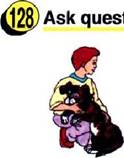 12 Ask questions and answer
with short answers as in the example:
12 Ask questions and answer
with short answers as in the example:
1. John / dog? 2. boy / bike? 3. children I television? Has
John got a dog?![]()
Yes, he has.. .![]()
12 Fill in the right word from the list as in the example:
mine yours his hers its ours our theirs their
1. The cat is .hers... ..... (Sally)
2. The car is ![]() . (You and Helen)
. (You and Helen)
3. These books are ![]() (Donna and l)
(Donna and l)
4. Are those cards ![]() ? (Debbie and Jane)
? (Debbie and Jane)
5. It is ![]() food. (dog)
food. (dog)
6, That
red car is ![]() , (Jane),
, (Jane),
7. Those flowers are ![]() (Mother)
(Mother)
8. When is ![]() birthday? (Father)
birthday? (Father)
9. ![]() car is black. (Jack and Joan)
car is black. (Jack and Joan)
10. That bag is![]()
13 Put the verbs into the Present Continuous or Simple Present.
1, Mary is washing , (wash) her hair at the moment.
2. My brothers ![]() (play) basketball now.
(play) basketball now.
3. My father ![]() (work) in a bank.
(work) in a bank.
4. My mother always ![]() (go) to the supermarket on Fridays.
(go) to the supermarket on Fridays.
5. Julia![]() (paint) a picture at the moment.
(paint) a picture at the moment.
6. Michael![]() (not/live) in Athens.
(not/live) in Athens.
7. Lucy![]() (wear) her new shoes now.
(wear) her new shoes now.
8. Trevor .![]() (nothike) potatoes.
(nothike) potatoes.
9. My father always ![]() (drive) to work.
(drive) to work.
10. We ![]() (do) our homework at the moment.
(do) our homework at the moment.
JW
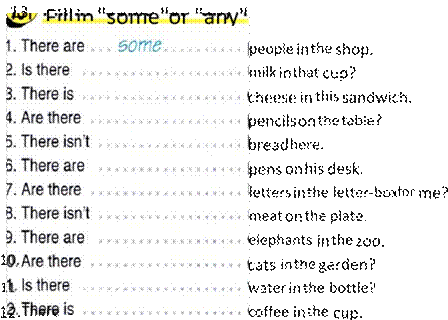
Write the words in the correct column as in the examples:
![]()
box money pencil star water circus bag book cheese tomato dress meat bread milk tea pen
Countable Nouns Uncountable Nouns
![]()
![]()
![]()
Fill in with "a", "an" or "some".
1.
![]()
![]() teacher .
jam 15.
teacher .
jam 15.![]() sugar
sugar
2.
![]() egg lemonade 16.
egg lemonade 16.![]() bowl of sugar
bowl of sugar
3.
tea meat 17.![]() milk
milk
4.
umbrella bottle
of Coke 18.![]() carton of milk
carton of milk
5.
shirt coffee 19.![]() glass of water
glass of water
6.
![]() money loaf of bread 20.
money loaf of bread 20.![]() water
water
7.
![]() spoon bread 21.
spoon bread 21.![]() octopus
octopus
![]()
Fill in "There is", "There are", "Is there" or "Are there".
![]() There are. some eggs in the basket 9.
There are. some eggs in the basket 9.![]() any mice under the bed?
any mice under the bed?
2, ![]() some butter in the fridge.
some butter in the fridge. ![]() 10.
10.![]() any Coke in the bottle?
any Coke in the bottle?
3. ![]() any knives on the table? 11.
any knives on the table? 11.![]() any water in the glass? 4.
any water in the glass? 4. ![]() any popcorn in the box? 12.
any popcorn in the box? 12.![]() any horses in the field? 5,
any horses in the field? 5, ![]() any jam in this sandwich? 13
any jam in this sandwich? 13![]() monkeys in the zoo?
monkeys in the zoo?
|
6. |
|
some birds in the tree. |
14. |
apples in the fridge. |
|
|
|
trees in the garden? |
15. |
some flowers in the vase. |
|
8. |
|
any money in that box? |
16. |
any milk in the fridge? |
Fill in "Am", "Is", "Are", "Do" or "Does' .
![]()
![]() you want to come with us? she
work hard?
you want to come with us? she
work hard?
2. she like her new house?you still angry with me?
3. he ill?he finish work at 6 pm?
4. they going to be at the party?you coming to the party tonight?
5. he like your new dress?I late again?
Ask and answer the questions as in the examples:
![]()
![]() 2, Look at
2, Look at ![]() them! . Are they apples?
them! . Are they apples?
No, they aren't. ![]()
They are trees,
![]()
![]()
![]() 4. Look at
4. Look at ![]()
![]() bicycles?
bicycles?
6.
![]()
![]()
![]()
![]() Look at
Look at ![]()
![]() a church?
a church?
IW
137 Write the -ing form for these verbs.
|
1. help |
helping |
4. make |
|
7. drive |
|
|
2. look |
|
5. walk |
|
8. write |
|
|
3. buy |
|
6. laugh |
|
9. hit |
|
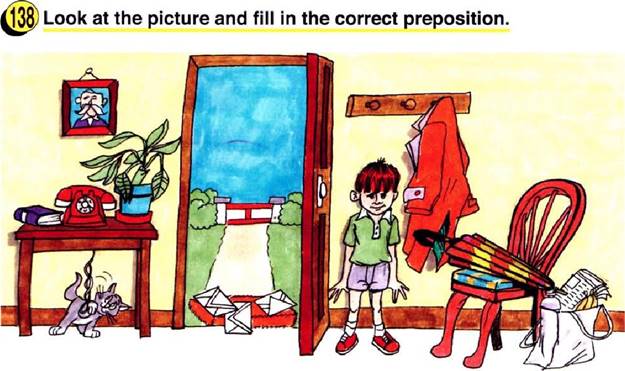
There is a plant 1) .on.. the table. There is a telephone 2) ![]() the book and the plant. There is a
picture 3)
the book and the plant. There is a
picture 3) ![]() the table. There is a cat 4)
the table. There is a cat 4) ![]()
![]() the table. There is a mat 5)
the table. There is a mat 5) ![]() the door. 6)
the door. 6) ![]() the mat there are some letters.
There is a shopping bag 7)
the mat there are some letters.
There is a shopping bag 7)![]() the chair. There is a newspaper 8)
the chair. There is a newspaper 8) ![]() the shopping bag. 9)
the shopping bag. 9)![]() the chair there is an umbrella. There
is a boy 10)
the chair there is an umbrella. There
is a boy 10) ![]() the door.
the door.
139 Put the verbs in the "Simple Present" or "Present Continuous".
![]() Kate: Hello Peter! What (1) . . . are
you doing (you/do) right now? peter:(play) with my dog Rex.
Kate: Hello Peter! What (1) . . . are
you doing (you/do) right now? peter:(play) with my dog Rex.
Kate:(you/want) to take Rex for a walk on the beach?
Peter: No, Rex (4)![]() (not/like) the sea! Kate.
(not/like) the sea! Kate.![]() (he/like) the park? peter: Yes, he
does, Let's go there now!
(he/like) the park? peter: Yes, he
does, Let's go there now!
![]()
14 Put the verbs into the "Simple
Present" or "Present Continuous"![]()
I
(1).. am watching . (watch) television now. I (2) ![]() (not / know) the name of the
television programme. It (3)
(not / know) the name of the
television programme. It (3) ![]() (finish) at seven o'clock. My sister (4)
(finish) at seven o'clock. My sister (4)![]()
![]() (listen) to the radio now in the
kitchen. She (5)
(listen) to the radio now in the
kitchen. She (5) ![]() (make) a cake. She (6)
(make) a cake. She (6) ![]() (not / like) television. She (7) (read) a lot of books. She (8)
(not / like) television. She (7) (read) a lot of books. She (8) ![]() (go) to the library every Saturday,
and (9)
(go) to the library every Saturday,
and (9)![]()
(borrow)
four or five books. I (10) ![]() (not / know) how many books she
(not / know) how many books she
(11) ![]() (have) in her room.
(have) in her room.
141 Fill in "in", "at" or "on".
![]()
![]()
![]() Monday noon 11
.
Monday noon 11
.![]() August
August
2.
May the
morning 12.![]() midnight
midnight
3.
summer 1995 13.![]() 10 0'clock
10 0'clock
4.
8 0'clock Sunday
morning 14.![]() August 2nd
August 2nd
5.
Christmas the
afternoon 15. ![]() Monday afternoon
Monday afternoon
Complete the sentences using "be going to" or Present Continuous.



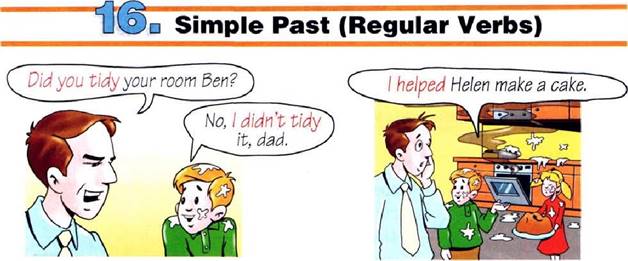
|
|
Long form |
Short form |
|
|
I walked |
I did not walk |
I didn't walk |
Did I walk? |
|
You walked |
You did not walk |
You didn't walk |
Did you walk? |
|
He walked |
He did not walk |
He didn't walk |
Did he walk? |
|
She walked |
She did not walk |
She didn't walk |
|
|
It walked |
It did not walk |
It didnt walk |
Did it walk? |
|
We walked |
We did not walk |
We didnt walk |
Did we walk? |
|
You walked |
|
You didrù walk |
|
![]()
![]() We form the past tense of regular
verbs by adding
We form the past tense of regular
verbs by adding![]()
They walked![]() They did not walk They didn't walk Did they walk?
They did not walk They didn't walk Did they walk? ![]()
![]()
|
love - loved like - liked |
study - studied stay - stayed |
stop - stopped prefer - preferred |
walk - walked listen - listened |
143 Write the Simple Past of the following verbs.
1. ![]()
![]() watch 7. walk
watch 7. walk![]() 13. play 19. climb
13. play 19. climb![]()
2. clean 8. visit![]() 14. study 20. stay
14. study 20. stay![]()
3. stop 9, work![]() 15. love 21. call
15. love 21. call![]()
4. arrive 10. look ![]() 16. open 22. kiss
16. open 22. kiss![]()
5, return ![]() 11. like
11. like![]() 17. start 23.
tidy
17. start 23.
tidy![]()
6. cook , 12,
iron![]() 18. water
18. water![]() 24. wash
24. wash![]()
![]()
We use the Past tense for actions which happened in the past at a definite time.
![]() Helen
and Peter usually share the jobs at work but last week Helen was ill, so Peter
did all the jobs. Write sentences as in the example:
Helen
and Peter usually share the jobs at work but last week Helen was ill, so Peter
did all the jobs. Write sentences as in the example:
Usually Yesterday


clean the water the listen to floor flowers watch TV the radio

You
1. Mike cleaned the floor and watered the
flowers yesterday ![]()
![]() He didn't watch TV or listen to the
radio.
He didn't watch TV or listen to the
radio. ![]() 2, Simon
2, Simon![]()
![]()
3.
Mr
and Mrs Hill![]()
![]()
4.
Helen![]()
![]()
![]()
l/you/he/she/it I
/ you / he / she / it ![]() we / you / they did. No' we/ you
/ they didn't.
we / you / they did. No' we/ you
/ they didn't.![]()
146 Look again at exercise 145 then ask and answer.
1 Mike/listen to the radio? Did Mike listen to the radio yesterday? No, he didn't.
2, Mike/watch TV?![]()
3.
Simon/clean
the floor?![]()
4.
Simon/water
the flowers?![]()
5.
Simon/watch
TV?![]()
6 Mr and Mrs Hill/clean the floor?![]()
7.
Mr
and Mrs Hill/listen to the radio?![]()
8.
Mr
and Mrs Hill/water the flowers?![]()
![]() (visit) my
(visit) my
(help) my
(clean)
(watch)
(play) outside
(12) ![]() (open) our front door and we all
(13)
(open) our front door and we all
(13)![]() (walk) inside.
(walk) inside.
![]() (help) our
(help) our
(clean)
(wash)
(cook)
(not / be)
(be)
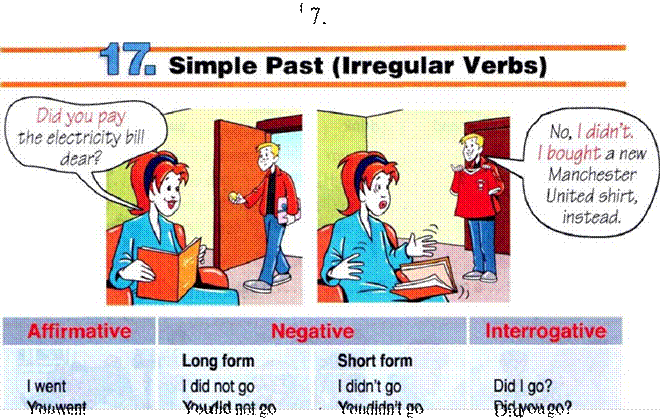 Long form Short form
Long form Short form
|
He went |
He didn't go |
Did he go? |
|
She went |
She didn't go |
Did she go? |
|
It went |
It didnt go |
Did it go? |
|
We went |
We didn't go |
Did we go? |
|
You went You did not go |
You didn't go |
Did you go? |
|
They went Fill in the blanks. |
They didnt go |
Did they go? |
|
Present Past |
Present |
Past |
|
|
|
|
3. buy16. read
4.
come 17. ![]() rode
rode
|
6. |
|
cost |
19. |
|
|
|
7. |
drink |
|
20. |
sit |
|
|
8. |
drive |
|
21. |
|
swam |
|
9. |
|
ate |
22. |
|
spent |
|
10 |
have |
|
23. |
take |
|
|
11. |
|
went |
24. |
tell |
|
|
12. |
lose |
|
25, |
|
wrote |
|
13. |
make |
|
26. |
get |
|
5.
![]()
![]()
![]() cut 18.
cut 18.![]() ran
ran
150 Fill in the blanks with verbs from the box in the Simple Past.
|
break |
swim |
have |
make |
sit |
write |
|
buy |
spend |
drink |
lose |
wash |
|

|
1 . She made . . a cake |
2. She . |
a hat |
3. The boy |
|
an hour ago. |
last week. |
|
letter yesterday. |
![]()

|
4. They |
5. They |
in the sea |
6. They |
a lot of |
|
plates a minute ago. |
for an hour. |
|
Coke last night. |
|
![]()
![]()
![]() 7. She her
7. She her 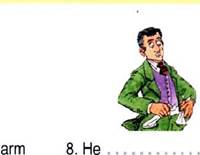 arm all his
arm all his![]() a bath last week, money last week,
two minutes ago.
a bath last week, money last week,
two minutes ago.
![]()

|
10. He |
1 1 . She |
12. She |
the clothes |
|
wallet last night. |
old chair a minute ago, |
yesterday. |
|
![]() m.
m.
Complete the sentences.
![]()
|
|
play tennis yesterday. |
l . . . didn't |
play tennis yesterday. |
|
2. You |
|
You |
go to the theatre. |
|
|
feed the dog. |
|
|
|
4. They |
|
They |
send a letter. |
|
5. She |
|
She |
find her keys. |
15 Complete the sentences.

cut read write
meet / friends
the grass a magazine a letter

1.
Jane
. read a magazine and wrote a letter yesterday, She didn't cut the ![]() .
. . . grass or meet her friends yesterday.
.
. . . grass or meet her friends yesterday.![]()
2.
Peter![]()
![]()
3.
Pam
and Ben![]()
![]()
4.
Ann![]()
![]()
![]()
![]() 15 Look again at exercise 152, then
ask and answer.
15 Look again at exercise 152, then
ask and answer.
I , Jane / meet / friends / yesterday? Did Jane meet her frienå5 yesteråay? No, she didn't,
2. Jane / cut the grass / yesterday?![]()
3. Peter / write a letter / yesterday?![]()
4, Peter / meet his friends /
yesterday? ![]()
5. Pam and Ben I
write a letter / yesterday?![]()
6, Pam
and Ben I meet their friends / yesterday?![]()
7, Ann / write a letter / yesterday? ![]()
8. You I meet your friends / yesterday?![]()
9. You / cut the grass I yesterday?![]()
10.
You / write a
letter / yesterday?![]()
15 (a). Write what Jean did or didn't do yesterday.
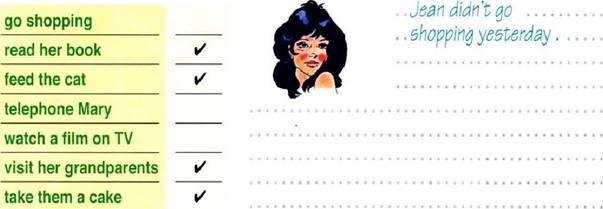
(b). Write what you did or didn't do yesterday.
![]()
![]()
15 Fill in the blanks with the Simple Past of the verbs in brackets.
Last Saturday my father took (take) my friends and me to the circus. We (1) (see) lots of things. My father (2) (buy) us some popcorn and orange juice. We
![]() (eat) the popcorn and (4) (drink)
the orange juice. We (5)
(eat) the popcorn and (4) (drink)
the orange juice. We (5)![]()
(laugh) at the funny clowns. There (6) (be) a
lion-tamer. The lions (7) (do) tricks; they (8) ![]() (jump) through hoops. A girl (9)
(jump) through hoops. A girl (9) ![]() (ride) an elephant around the ring.
We all (10)
(ride) an elephant around the ring.
We all (10) ![]() (have) a wonderful time.
(have) a wonderful time.
Choose the right verb, put it in the Simple Past and fill in the blanks.
|
write |
drink |
do |
see |
buy |
sit |
meet |
|
drive |
be |
tell |
come |
take |
cost |
go |
Yesterday
morning we 1) went . to the market. We 2)![]() our shopping baskets. Father 3)
our shopping baskets. Father 3) ![]() us there in the car, At the market,
we 4)
us there in the car, At the market,
we 4)![]() some fruit and vegetables. 1 5)
some fruit and vegetables. 1 5) ![]() some birds that I wanted to buy. They 6)
some birds that I wanted to buy. They 6) ![]() a lot of money. Mother 7) me they 8)
too expensive. Then we 9) some friends and we all 10)
a lot of money. Mother 7) me they 8)
too expensive. Then we 9) some friends and we all 10) ![]() to a café. We 11)
to a café. We 11)![]() at a table outside and 1 2)
at a table outside and 1 2) ![]() orange juice. Then Mother and 1 13)
orange juice. Then Mother and 1 13)![]() home. In the afternoon 1 14)
home. In the afternoon 1 14) ![]() my homework and 15)
my homework and 15)![]() a letter to my grandmother,
a letter to my grandmother,
15 Complete the sentences with one word or phrase from the box.
|
on Sundays at the moment |
in the evening last week |
|
usually last night yesterday every morning |
tomorrow two months ago |
|
|
6. We drink milk for breakfast |
|
2. We are going to visit them |
7. Father doesn't work |
|
3. Tom went to bed at 12 0'clock |
8. She wrote a letter to John |
|
4. She
watches TV |
9. Dont go outside! It's raining |
|
5. You didn't come to school |
10. He telephoned me |
158 Put the verbs into the correct tense.
She always goes (go) to church on Sunday.
![]() (buy) a new bicycle last week.
(buy) a new bicycle last week.
3. My
family![]() (go) to the theatre yesterday.
(go) to the theatre yesterday.
4 Tom![]() (live) in London three years ago.
(live) in London three years ago.
5. My mother![]() (make) some coffee now.
(make) some coffee now.
6. Sam![]() (go) to the circus tomorrow.
(go) to the circus tomorrow.
![]() (talk) on the telephone at the moment.
(talk) on the telephone at the moment.
8.
Sally always![]() (tidy) her room at the weekend.
(tidy) her room at the weekend.
![]() (have) dinner in a restaurant last Friday.
(have) dinner in a restaurant last Friday.
|
|
|
|
|
Question Words (Who—Whose—What— |
When-Where-Why-How much/How many)
![]()
|
1. At the circus. |
A. Who? |
1. |
|
2. 8.30 pm. |
B. When? |
2. |
|
3. A bird. |
C. How much money? |
3. |
|
4. Twelve. |
D. How many? |
4. |
|
5. Tony. |
E. Why? |
5. |
|
6. Because she is clever. |
F. Whose? |
6. |
|
7. On Monday. |
G. Where? |
|
|
8. Ben's. |
H. What time? |
8. |
|
|
l, What? |
9. |
![]()
![]()
![]()
![]()
![]()
![]()
![]()
![]()
![]()
![]()
![]()
![]()
![]()
![]()
![]()
![]()
![]()
![]()
![]()
![]()
![]()
![]()
![]()
![]()
![]()
![]()
![]()
![]()
![]()
![]()
![]()
![]()
![]()
![]()
![]()
![]()
![]()
![]()
![]()
![]()
![]()
![]()
![]()
![]()
![]()
![]()
![]()
![]()
![]()
![]()
![]()
![]()
![]()
![]()
![]()
![]() Some
reporters are interviewing John Birch, a famous pop singer.
Some
reporters are interviewing John Birch, a famous pop singer.
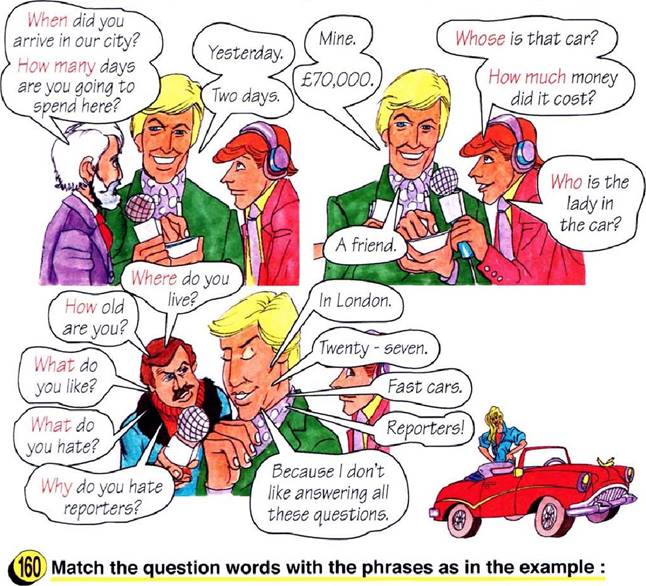
16 Fill in "Who", "Whose", "What", "When", "Where", "Why" "How much", "How many" or "What time".
![]()
![]() When?... . At 2:30. ?
Sophia's.
When?... . At 2:30. ?
Sophia's.
2. ![]() ? At the cinema. ? Mary.
? At the cinema. ? Mary.
3. ![]() ? The teacheL ? 10 0'clock.
? The teacheL ? 10 0'clock.
4. ![]() ? In the morning. ? Next Thursday.
? In the morning. ? Next Thursday.
5, ![]() ? In the kitchen. ?
Four.
? In the kitchen. ?
Four.
6. ![]() ? My brother's. ? In the park.
? My brother's. ? In the park.
7. ![]() ? Because it's cold. ? Mary's.
? Because it's cold. ? Mary's.
8. ![]() ? On Saturday. ? A car.
? On Saturday. ? A car.
9. ![]() ? In the classroom. ? £45. 10.
? In the classroom. ? £45. 10. ![]() ? At the station. ? Tomorrow.
? At the station. ? Tomorrow.
11, ![]() ? John's. ?
8 pm.
? John's. ?
8 pm.
12. ![]() ? An umbrella. ?
A cup.
? An umbrella. ?
A cup.
16 Choose the correct word.
![]() 1 What
. is it? It's a bird,are you late?
1 What
. is it? It's a bird,are you late?
A) Who B) Where C) WhatB) Who C) Why
2. ![]() is that radio? My father's. is
your sister's name?
is that radio? My father's. is
your sister's name?
A) What B) Whose C) WhenB) Who C) Why
3. ![]() is that girl? My cousin. is it?
It's 2 0'clock
is that girl? My cousin. is it?
It's 2 0'clock![]()
A) Who B) Where C) WhoseB) What time C) When
4. ![]() do you go to the shops? does the
film start?
do you go to the shops? does the
film start?
A) What B) Whose C) WhenB) When C) What
5. ![]() is the dog? In the garden. speaks
English?
is the dog? In the garden. speaks
English?
A) Whose B) What C) WhereB) Where C) Why
Fill in the blanks with "Who", "Whose", "What", "When",
![]() "Where","Why",
"How much", "How many" or "What time".
"Where","Why",
"How much", "How many" or "What time".
|
I |
Why • |
are you wearing a coat? Because
it's cold |
|
2, |
|
is your party? On Saturday. |
|
3. |
|
are these football boots? They're John's. |
|
4. |
|
money have you got? £10. |
|
5. |
|
is your school? It's near the station. |
|
6. brothers have you got? Two brothers. |
|
|
|
|
|
8. |
is he? He's Mr Smith. |
|
9, |
are you reading that book? Because it's interesting, |
|
10. |
people are there in this room? Twenty. |
|
11 |
coat is this? It's John's. |
|
12 |
does he come from? He comes from Brazil. |
|
13. |
is your birthday? In January. |
|
14. |
is it? 7.30. |
|
15. |
are you running? Because I am late. |
|
16, |
sugar is there? One kilo. |
|
17. |
are you going tonight? TO the cinema. |
|
18. |
is he? In the kitchen. |
|
1 9. |
girls are there? Twelve. |
|
20, |
are they doing? They are watching TV. |
Fill in with "Who", "What", "Where", "When' or "What time",
1. Where is the cheese? It's in the fridge.
2.
![]() is your party? On January 21st.
is your party? On January 21st.
3.
![]() is your brother's name? Michael.
is your brother's name? Michael.
4.
![]() is that man? He's my uncle.
is that man? He's my uncle.
5.
![]() do you visit your grandparents? On Sundays.
do you visit your grandparents? On Sundays.
6. have you got?A box of chocolates.
![]() does this lesson finish? At eleven o'clock.
does this lesson finish? At eleven o'clock.
8. ![]() is the cat? It's on the chair.
is the cat? It's on the chair.
9. ![]() can answer my question? I can.
can answer my question? I can.
1 0. ![]() is there in that bag? Some apples
and oranges.
is there in that bag? Some apples
and oranges.
Your teacher divides the class into two groups and then says words. The groups in turn say which question word matches the word said by the teacher. Each correct answer gets 1 point.
The group with the most points is the winner
![]() Teacher .
Teacher .![]() at the station. Group A S2
at the station. Group A S2![]() whose? Group A Sl
whose? Group A Sl![]() where? Teacher
where? Teacher![]() Mary.
Mary.
Teacher . at noon. Group
B S2![]() whose?
whose?
Group B Sl![]() when? Teacher . Wrong! Who! Group B gets Teacher . Nick's.no point.
when? Teacher . Wrong! Who! Group B gets Teacher . Nick's.no point.
|
|
|
|
|
|
|
Comparisons |
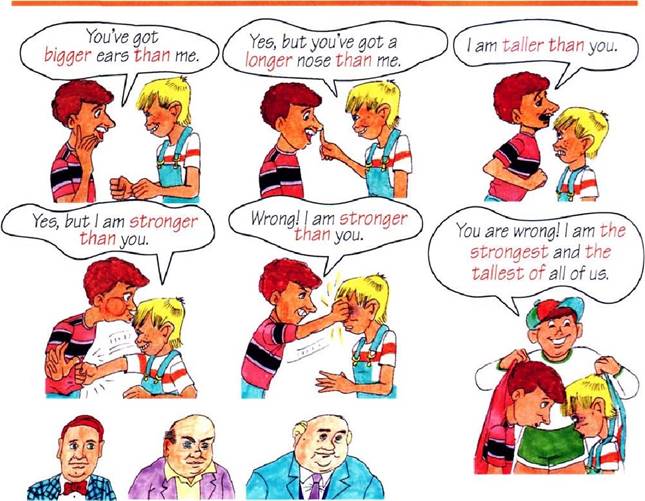
 one syllable long longer
than the longest of / in
one syllable long longer
than the longest of / in
two syllables happy happier than
![]()
|
|
ier / jest |
one stressed vowel between two consonants double the consonant |
|
large - larger - largest |
heavy - heavier - heaviest |
big - bigger - biggest BUT old older - oldest |
![]() Adjectives ending in:
Adjectives ending in:
the happiest of / in
![]()
the most beautiful of/in
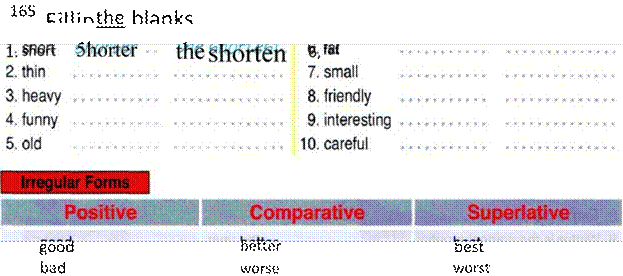
much more many / a lot more ![]() most
most ![]() little less least
little less least
![]()
166 Tommy, Tony and Terry
are brothers.What do we know about them? ![]() Tommy Tony Terry
Tommy Tony Terry


19.
16 Fill in the blanks with "than", "of" or "in".
1. My room is larger . . than yours.
2.
The
white car is the fastest ![]() the three cars,
the three cars,
3.
Watching
TV is more interesting ![]() listening to the radio.
listening to the radio.
4.
He
is the best student ![]() his class.
his class.
5.
She
has got the most money ![]() all.
all.
6.
I've
got more money ![]() you.
you.
7. Summer is hotter winter.
8.
Tom
is the oldest![]()
|
9. Winter is the coldest month 168 Complete the sentences. |
|
the year. |
|
|
David |
Tom |
|
George |

|
|
Age : 25 Age : 30 |
Age : 35 |
|||
|
|
Weight : 70 kgs Weight : 72 kgs |
Weight : 75 kgs |
|||
|
|
Height . 1 68 Height : 1,72 |
Height : 1,80 |
|||
|
|
Salary • £800/month Salary : £1000/month |
Salary : £15001month |
|||
|
|
House : 3 rooms House : 4 rooms |
House : 5 rooms |
|||
|
1 , |
(young) |
David is . younger than |
Tom and George. |
|
|
|
2. |
(old) |
George and Tom are |
|
David. |
|
|
3. |
(heavy) |
George
is the |
|
|
|
|
4, |
(light) |
Tom is |
|
|
|
|
5, |
(tall) |
Tom is |
|
|
|
|
6. |
(tall) |
George
is the |
|
|
|
|
7. |
(old) |
George
is |
|
|
|
|
8. (little) |
David
gets |
|
|
|
|
|
9. (much) |
George gets |
|
|
|
|
|
10. (small) |
David's house is |
|
Tom's. |
|
|
|
11. (big) |
George's
house is the |
|
|
||
|
12. (big) |
Tom's house is |
David's. |
|
||

![]()
![]() 4. A horse is
4. A horse is![]()
than a dog. (big)
![]()
![]() 6. George is
6. George is![]()
than James. (fat)
![]()
![]() 8. A mouse is
8. A mouse is![]()
than a cat. (small)

170 Complete the sentences.
1. (fast) My car is faster
than..![]() yours,
yours,
2. (thin) She is the![]()
3. (interesting) It is the![]() book of the three of them.
book of the three of them.
4. (short) Paula is![]() Helen.
Helen.
g 9.
|
5 |
(d ifficult) |
Mathematics is |
History. |
|
|
6, |
(pretty) |
She is the
|
|
|
|
7. |
(happy) |
Tm is |
|
|
|
8. |
(careful) |
Tom is |
|
|
|
9. |
(bad) |
Don is the
|
student |
class. |
|
10. (beautiful) |
Karen is |
|
|
|
17 Compare yourself with Mary Taylor.
Name: Mary Taylor Name:
![]()
![]() Age: 23
Age: 23
Height: 1.70m
Weight: 55 kgs
House: 10 rooms
i . Mary is older than me.![]()
2. Mary is![]()
3. Mary is![]()
4, Mary's house is
![]()
1. Competition Game: Your teacher will divide the class into two groups and say an adjective. The groups, in turn, will tell him/her its comparative and superlative forms.Each correct answer gets 1 point. The group with the most points is the winner.
![]() Teacher: thinTeacher: big
Teacher: thinTeacher: big
Group A Sl: thinner - the thinnestGroup A S2: more big - most big
Teacher: boringTeacher: Wrong! bigger - the biggest Group B Sl: more boring - the most boringGroup A gets no point.
2. Your teacher will divide the class into two groups and say an adjective or adverb. The groups in turn say its opposite. Each correct answer gets I point, The group with the most points is the winner.
![]() Teacher: bigTeacher: tall
Teacher: bigTeacher: tall
Group A Sl: smallGroup A S2: small
Teacher: youngTeacher: Wrong! Short. Group A gets Group B Sl : oldno point.
|
2. I am a student. |
5. He is a good doctor. |
|
|
3. She is a woman. 17 Fill in with "some" or "any". |
6, That is a big box. 4. |
|
1. ![]()
![]()
![]()
![]()
![]()
![]()
![]()
![]() There are . . some. glasses on the
table. There isn't
There are . . some. glasses on the
table. There isn't![]() Coke in the bottle.
Coke in the bottle.
2. Is there![]() milk in the fridge? 5. Are there
milk in the fridge? 5. Are there![]() students in the
students in the
3. There is![]() water in the glass, classroom?
water in the glass, classroom?
17 Fill in the blanks using "in", "at" or
"on"![]()
![]()
![]()
![]() On Sunday. February
1st. the morning.
On Sunday. February
1st. the morning.
1 . the afternoon. 5. summer.1992.
2, night,Easter.Christmas,
3. 3 0'clock,Thursday morning. 11. August.
175 Fill in the blanks with the Simple Present or Present Continuous.
Every day my father (I) , drives. (drive) to work, He (2) ![]() (work) in a bank, He (3)
(work) in a bank, He (3) ![]() (like) his job. He (4)
(like) his job. He (4) ![]() (get) up at seven o'clock every morning
and he (5)
(get) up at seven o'clock every morning
and he (5) ![]() (make) breakfast for us all, We
(make) breakfast for us all, We
![]() (eat) breakfast at the moment. He always (7)
(eat) breakfast at the moment. He always (7) ![]() (leave) home at half past seven. At
the moment he (8)
(leave) home at half past seven. At
the moment he (8) ![]() (laugh) because Ted, my brother, (9)
(laugh) because Ted, my brother, (9) ![]() (tell) him a joke.
(tell) him a joke.
17 Fill in "Who", "Whose", "What time", "Where" or "Why".
1 . What time is it? 8.30.
2.
![]() is this car? It's my father's.
is this car? It's my father's.
3.
![]() is she? She's my sister.
is she? She's my sister.
4.
![]() is the milk? It's in the fridge.
is the milk? It's in the fridge.
5.
![]() are you wearing your coat? Because it is cold outside. 6,
are you wearing your coat? Because it is cold outside. 6, ![]() did she leave? At 6.20.
did she leave? At 6.20.
IV
177 Look at the picture and complete the sentences with the correct preposition from the list below:
![]()
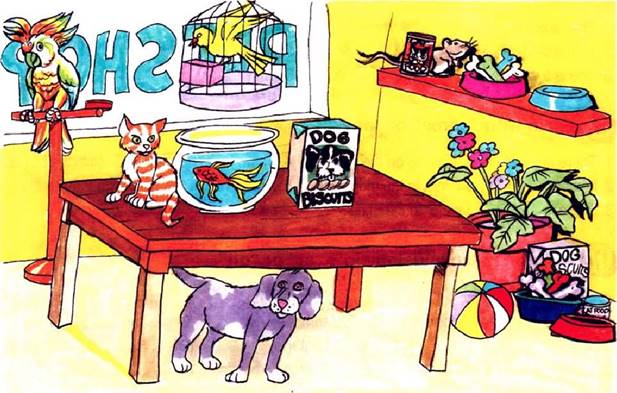
next to on in front of above in behind between under
Look at this pet shop. There is a
goldfish bowl![]() on
on ![]() (1) the table. There is a goldfish
(1) the table. There is a goldfish
![]() (2) the bowl. The cat is
(2) the bowl. The cat is![]() (3) the bowl. The dog is
(3) the bowl. The dog is![]()
(4) the table and ![]() (5) the goldfish bowl there is a bird in a cage. The
goldfish bowl is
(5) the goldfish bowl there is a bird in a cage. The
goldfish bowl is ![]() (6) the cat and the box of dog biscuits. There's a ball
(6) the cat and the box of dog biscuits. There's a ball ![]() (7) the plant. There's a mouse
(7) the plant. There's a mouse ![]() (8) the cat food.
(8) the cat food.
17 Fill in "How much" or "How many".
1. How much. money have you got?
2.
![]() water is there in the bottle?
water is there in the bottle?
3.
![]() trees are there in the garden?
trees are there in the garden?
4.
![]() milk does the baby drink?
milk does the baby drink?
5.
![]() friends have you got?
friends have you got?
179 Some of the tenses of the underlined verbs are wrong. Find the mistakes and correct them.
John (I) waits for the bus now, He (2) takes the bus to school every morning because his school (3) was far away. It (4) is raining, so John (5) holds an umbrella. He (6) likes taking the bus
![]()
because many of his friends (7) ride on it.
1. . 15 waiting 2.![]() 3.
3.![]() 4.
4.![]()
5. ![]() 6.
6.![]() 7.
7.![]()
180 Fill in with Simple Past.
Last
Sunday we (1) went . (go) on a picnic in the country. My mother (2) (drive) the
car. My father (3) ![]() (sleep) all the way there because he (4)
(sleep) all the way there because he (4) ![]() (be) tired. When we (5)
(be) tired. When we (5) ![]() (arrive) we (6)
(arrive) we (6) ![]() (run) straight to the riveL We (7)
(run) straight to the riveL We (7) ![]() (swim) for a long time and then we
(8)
(swim) for a long time and then we
(8) ![]() (eat) our lunch. After lunch my father and I (9)
(eat) our lunch. After lunch my father and I (9) ![]() (play) rugby. We (10)
(play) rugby. We (10) ![]() (leave) at six o'clock and (11)
(leave) at six o'clock and (11) ![]() (go) home. We all (12)
(go) home. We all (12) ![]() (have) a lovely time.
(have) a lovely time.
18 Mary and Sam are talking about their last summer holidays. Fill in the blanks with the Simple Past.
Mary: Where (1) did you go (you / go) on holiday last summer?
Sam: ![]() (go) to France to visit my cousins
there.
(go) to France to visit my cousins
there.
Mary: How long (3) ![]() (you / stay)?
(you / stay)?
Sam, ![]() (stay) for two months and I (5)
(stay) for two months and I (5) ![]() (have) a wonderful time. Where (6)
(have) a wonderful time. Where (6) ![]() (you / spend) your holidays?
(you / spend) your holidays?
Mary: We (7) ![]() (not / go) anywhere. My mother (8)
(not / go) anywhere. My mother (8)![]()
(be) in
hospital, so we (9)![]() (stay) at home.
(stay) at home.
Sam: That's too bad!
Mary:
Well, she (10) ![]() (come) home after three weeks, and we (11)
(come) home after three weeks, and we (11) ![]() (be) happy to see her,
(be) happy to see her,
18 Put the verbs into the "Simple Present" or "Present Continuous".
Donna: Hello, David. How are , . (be) you?
David:
I (I)![]() (be) fine, thanks!
(be) fine, thanks!
Donna:
(2)![]() (be) your father at home?
(be) your father at home?
JV
|
David: |
No, he (3)
|
|
|
|
at home. I (5) |
|
|
Donna: |
Where (6) |
|
|
David: |
My mother (8)
|
|
|
|
(10) |
|
|
Donna: |
What (11) |
|
|
David: |
I (12) |
|
|
Donna: |
Please ask your mother or father to phone me later. |
|
|
David: |
Okay. Bye. |
|
|
Donna: |
Bye. |
|
183 Fill in the blanks and answer the questions as in the example:
![]()
![]() I
. Look at her! .
I
. Look at her! .![]() 2, Look at
2, Look at![]()
Is
she a singer? ![]() Are they geese?
Are they geese?
No, she isn't,![]()
She
a teacher, ![]()

Fill in the blanks with "This", "These", "That" or "Those".
![]() are shoes.
are shoes. 
2. ![]() is a chair.
is a chair. 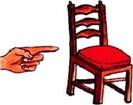
![]() is a bird.
is a bird. 
185 Find the differences in picture A using comparisons.
Picture A Picture B
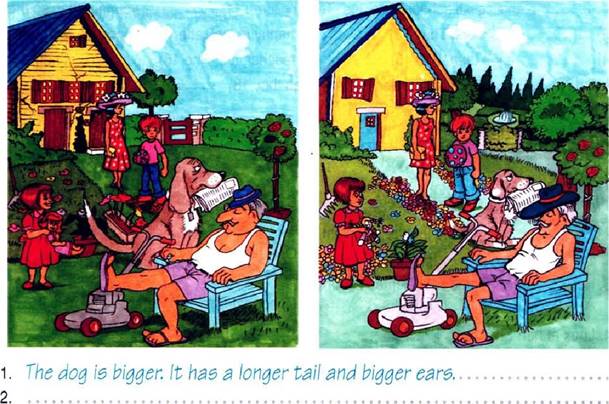
![]()
![]()
![]()
![]()
![]()
![]()
![]()
![]()
![]()
![]()
![]()
186 Choose one verb from the box and fill in the blanks.
have hasn't got lived is go were works stays had live didn't stay are was didn't go worked
They 1)![]() live . . in a big house in London. Mr
Smith 2) in a school. He
live . . in a big house in London. Mr
Smith 2) in a school. He
3)![]() a teacher. Mr and Mrs Smith 4) two
children, Tina and Andrew They 5)
a teacher. Mr and Mrs Smith 4) two
children, Tina and Andrew They 5)![]() to school. They 6) very good
students. Mrs Smith 7) at
to school. They 6) very good
students. Mrs Smith 7) at ![]() home, she 8) a job now. Last year the family 9) in France. Mr Smith 10)
home, she 8) a job now. Last year the family 9) in France. Mr Smith 10) ![]() in an English school there, too.
Their children 11) younger then so they 12) to school, They 13) a nanny to look
after them because Mrs Smith 14) a job then. She 15) a teacher, too. She 16) at
home. They 17) all a lot happier this year than they 18) in France last year,
in an English school there, too.
Their children 11) younger then so they 12) to school, They 13) a nanny to look
after them because Mrs Smith 14) a job then. She 15) a teacher, too. She 16) at
home. They 17) all a lot happier this year than they 18) in France last year,
18 Choose the correct item.
i .
She ![]() now.
now.
A) is sleeping B) sleeps C) slept
2. They ![]() to the theatre last night.
to the theatre last night.
A) are going C) went
3. He ![]() some new clothes tomorrow.
some new clothes tomorrow.
A) is going to buy B) buys C) bought
4. Look at her! She ![]()
A) cries B) is crying C) cried
5. He ![]() up late yesterday,
up late yesterday,
A) wakes B) is waking C) woke
![]() our grandparents tomorrow.
our grandparents tomorrow.
A) visited B) visit C) are going to visit
7.
Look! The cat![]() up the tree.
up the tree.
A) climb B) is climbing C) climbs
![]() to school yesterday
to school yesterday
A) didn't go B) don't go C) aren't going
9. He ![]() a bath at the moment.
a bath at the moment.
A) has B) had C) is having
10. I ![]() a pair of shoes yesterday.
a pair of shoes yesterday.
A) buy B) bought C) am buying
188 Find the mistakes and correct them.
1. How m y sugar do you want? much![]()
2. There are some money on the table. ![]()
3. That car is my,
4. ![]() She is the better student in the
class.
She is the better student in the
class.
5. Who is it? It's a box.
6. That cars are red.
7. Carol and John is listening to the radio.
8. There are two waters on the table.
9. They not watch TV in the morning.
10.
Jane don't like
coffee. ![]()
11.
Is
these a dog? ![]()
12.
She don't like
spaghetti. ![]()
13. They is playing in the garden.
14.
We has got a car. ![]()
15.
That dress is
her. ![]()
189 Find the mistakes and correct them.
1.
Are there s e
cars in the street? . any![]()
2.
The childr n is
at home. ![]()
3. How much trees are there in the picture?
4.
![]() Tom having
a bath.
Tom having
a bath.
5. She have got a watch.
6. Who is Sally? She is in the park.
7. They didn't came late last night.
8. She is oldest than her sister.
9. He don't like fish.
10.
We never go to
school in Sunday.![]()
11.
We didn't went to
school yesterday.![]()
12.
How much books
have you got? ![]()
13.
She is the taller
in her class. ![]()
14.
There are any
apples on the table. ![]() 1 5, When are the children? At school.
1 5, When are the children? At school.![]()
ÞreaTest ![]() (Units
(Units![]()
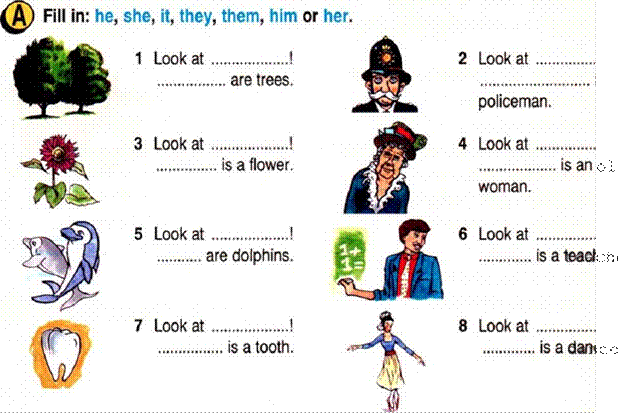 is a
is a
B Change to the plural.
9
It
is a deer. ![]()
10It is a bird. ![]()
11That is a knife.![]()
12This is a monkey.![]()
13She is a nurse.![]()
14That is a tooth.![]()
15She is a singer.![]()
16It is a guitar.![]()
17This is a bicycle. ![]()
18He is a magician. ![]()
![]()
![]() Fill in:
my, your, his, her, its, our, your or their.
Fill in:
my, your, his, her, its, our, your or their.
19He's got a dog.20 He's got flowers.
It's .![]() dog. They're
dog. They're ![]() flowers.
flowers.
Pre-rest 1
21
![]()
![]() She's got
an umbrella.
She's got
an umbrella.
22 We've got shorts.
It's umbrella.
They are .![]()
shorts.
23 You've got some24 He's got a banana.
books. It's![]()
They are books.banana.
25 I've got a guitar.26 They've got a TV.
It's ![]() guitar. It's
guitar. It's
![]() TV.
TV.
|
|
Fill in.• There is or There are. |
|
|
|
||
|
27 |
some cats in the garden. |
33 |
|
some records in the room. |
||
|
28 |
|
34 |
|
.. a chair in the room. |
||
|
29 |
|
35 |
|
|
||
|
30 |
|
36 |
|
.. a car in the garage. |
||
|
31 |
|
37 |
|
. some flowers in the vase. |
||
|
32 |
cupboard. Fill in:
some |
r any. |
38 |
|
|
|
|
39 |
There is . |
|
45 |
There isn't |
|
|
|
40 |
There
aren't |
|
46 |
There are |
|
boys in the classroom. |
|
|
the fridge, |
|
47 |
Is there |
|
cake in the cupboard? |
|
41 |
Is there |
|
48 |
There is |
|
|
|
42 |
There are |
|
49 |
There are
|
|
girls in the classroom. |
|
43 44 |
There isn't |
Coke in the cupboard.
|
50 |
Are
there |
|
|
F Put the verbs in brackets into the present continuous.
It is Saturday morning. The family is at the zoo.
Sally 51)![]()
(watch) a monkey. It 52) ![]() (eat) a
banana! John 53)
(eat) a
banana! John 53)![]()
![]() (look at) the lions. Father and Mother 54)
(look at) the lions. Father and Mother 54) ![]()
![]() (sit) under
a tree. They all like it at the zoo. They 55)
(sit) under
a tree. They all like it at the zoo. They 55)![]()
(have) a lovely time.
![]()
Put the verbs in brackets into the present continuous.
It is
Sunday morning. The family is at the park. It is a lovely day and the sun 56)![]()
![]() . (shine). John 57)
. (shine). John 57) ![]() . (play) on a swing and Sally 58)
. (play) on a swing and Sally 58) ![]() (run) after the dog. Mother 59)
(run) after the dog. Mother 59)![]()
(sit)
under a tree watching everybody and Father 60) ![]() (walk) by the river.
(walk) by the river.
![]()
![]() Look at the pictures and write what
they are doing.
Look at the pictures and write what
they are doing.
61 She
63 She
65 She
![]() I Write complete sentences about you.
I Write complete sentences about you.
69 Name![]()
70 Nationality:
71 Job ![]() 72
72![]()
73 Eyes:
74 Abilities:
Now write complete sentences about your friend.
75 Name: He/She
76
![]()
![]() Nationality: He/She
.
Nationality: He/She
.
77 Job: He/She
78 Hair: He/She
79 Eyes: He/She
80 Abilities: He/She
Complete the questions and the short answers.
![]()
![]() 1
1 ![]() . you like
Coke?
. you like
Coke?
2
![]() Father go to work in the morning?
Father go to work in the morning?
3
![]() they do their homework in the morning? No,
they do their homework in the morning? No,![]()
4
![]() she go to the zoo every day? No,
she go to the zoo every day? No,![]()
5
![]() she visit Grandmother at the weekends? Yes,
she visit Grandmother at the weekends? Yes,![]()
|
6 |
John drive a car? |
Yes, |
|
|
7 |
you like snakes? |
No, |
|
|
8 |
. . you help your father? |
No, |
|
|
9 |
she watch TV every day? |
Yes |
|
|
10 |
they play in the morning? |
No, . |
|
B Put the verbs in brackets into the present simple.
Mr Brown 11) ![]() (work) in a school. He 12)
(work) in a school. He 12)![]()
![]() (teach)
English. Sometimes he 13)
(teach)
English. Sometimes he 13) ![]() (go) to work on Saturdays, too. He 14)
(go) to work on Saturdays, too. He 14) ![]() (like) his
job and he 15)
(like) his
job and he 15) ![]() . (be) a good teacher. His students 16)
. (be) a good teacher. His students 16) ![]() . (love)
him.
. (love)
him.
C Put the verbs in brackets into the present simple.
John 17) ![]() . (ride) a bike well but he
18)
. (ride) a bike well but he
18)![]()
(not/ride) a horse. His sister 19) ![]() (be) good
at horse-riding. She 20)
(be) good
at horse-riding. She 20) ![]() (go) riding every day. She 21)
(go) riding every day. She 21) ![]() (have) a
white horse. Its name 22)
(have) a
white horse. Its name 22) ![]() (be) Snowy.
(be) Snowy.
D Fill in the correct preposition.
23) ![]() Sundays the children get up 24)
Sundays the children get up 24) ![]() 10
0'clock. 25)
10
0'clock. 25) ![]() the morning they watch TV and they usually go
to the park 26) the afternoon.
the morning they watch TV and they usually go
to the park 26) the afternoon.
Fill in the correct preposition.
Mandy goes to school 27) 8 0'clock and comes home 28) 2 0'clock. She does her homework 29) the afternoon. 30) the evening she watches TV,
C) Fill in.• How much or How many.
31 coffee do you want? 32 ![]() fish are there in the bowl?
fish are there in the bowl?
33 ![]() meat is there in the fridge?
meat is there in the fridge?
![]() tables are there in the classroom?
tables are there in the classroom?
35 ![]() sugar do you want in your tea?
sugar do you want in your tea?
36 ![]() . jam is there in the jar?
. jam is there in the jar?
Change to the plural.
43 This is a monkey.
![]()
44 That is a sheep.
![]()
45 It is a record.
![]()
46 She is a nurse.
37 ![]() students are there in your class?
students are there in your class?
38 ![]() Coke is there in the bottle? 39
Coke is there in the bottle? 39![]() cats are there in the garden?
cats are there in the garden? ![]() monkeys are there at the zoo?
monkeys are there at the zoo?
41 ![]() bottles are there in the cupboard?
bottles are there in the cupboard?
42 ![]() . money do you want?
. money do you want?
47 That is a tooth.
![]()
48 He is a policeman.
![]()
49 It is a church.
![]()
50
2
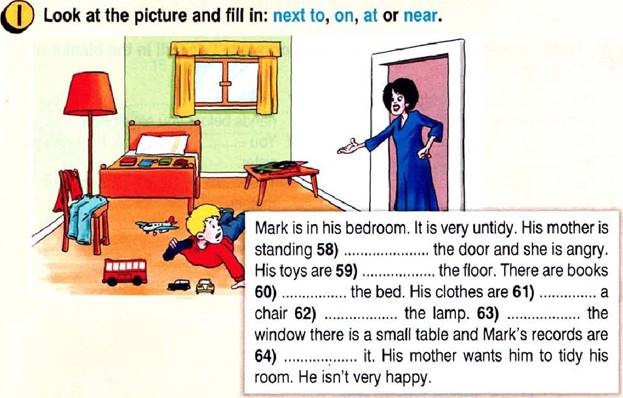
Put the verbs into the present simple or the present continuous.
John
usually 65) ![]() (go) to the park every Sunday but today it 66)
(go) to the park every Sunday but today it 66)![]()
![]() (be) Christmas Day. He 67)
(be) Christmas Day. He 67) ![]() (like) Christmas dinner and his mother 68)
(like) Christmas dinner and his mother 68) ![]() (cook) it at the moment, He 69)
(cook) it at the moment, He 69)![]()
![]() (play) with his new toys in the living room and his father 70)
(play) with his new toys in the living room and his father 70)![]()
![]() (watch) television now. His sister 71)
(watch) television now. His sister 71) ![]() (help) his mother in the kitchen. They always 72)
(help) his mother in the kitchen. They always 72) ![]() (have) fun at Christmas.
(have) fun at Christmas.
Put the verbs into the present simple or the present continuous.
Ann: Where is John?
sally: He 73) ![]() (wash) the car. He usually 74)
(wash) the car. He usually 74) ![]()
![]() (play) football on Saturdays, but
today he 75)
(play) football on Saturdays, but
today he 75)![]()
![]() . (not/want) to play.
. (not/want) to play.
Ann: Is your mother in the kitchen now?
Sally: Yes, she 76) ![]() (cook) dinner. I usually 77)
(cook) dinner. I usually 77) ![]()
![]() (make) the dinner on Saturdays but 1
78)
(make) the dinner on Saturdays but 1
78) ![]()
![]() (go out) now.
(go out) now.
Ann: Where?
sally: 1 79) ![]() (go) to my grandmother's. I always 80)
(go) to my grandmother's. I always 80)![]()
(visit) her at the weekend.
![]()
![]()
Father is telling his son what he must or mustn't do. Fill in the blanks with
must or mustn't.
I You ![]() forget to do your homework.
forget to do your homework.
2 Youdrink your milk.
3 You ![]() be late home. 4 You
be late home. 4 You ![]() be so noisy!
be so noisy!
5
You ![]() . remember to feed the dog,
. remember to feed the dog,
6
You ![]() leave your room untidy.
leave your room untidy.

11 the boy/go to the dentist's (like).![]()
![]()
![]()
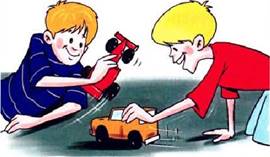
13 the children/play with their toys
(like) ,

7
You ![]() wash your hands before you eat
dinner.
wash your hands before you eat
dinner.
8
You .![]() fight with your sister.
fight with your sister.
9
You![]() help your mother.
help your mother.
10
You![]() visit your grandmother,
visit your grandmother,
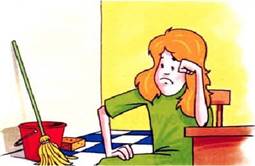
12 Annie/do the housework
(like)![]()
![]()
![]()
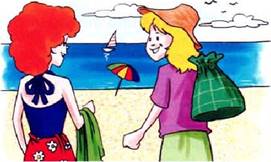
14 the girls/go to the beach
(like)![]()
![]()
(Yes, like)
![]()
3
C) Complete the sentences using "be going to" or the present continuous.

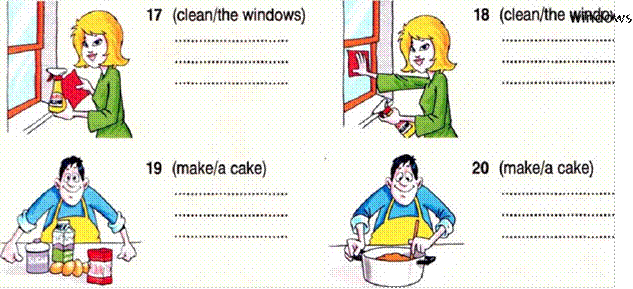
![]()
![]()
![]()
 22 (feed/the baby)
22 (feed/the baby)
D Fill in the blanks with: is, are were.
It 23)![]() Saturday today. The children 24)
Saturday today. The children 24)![]() at home. They 25)
at home. They 25)![]() . at school yesterday.
. at school yesterday.
Fill in the blanks with: is, are or were.
It 26)![]() four o'clock. The children 27)
four o'clock. The children 27)![]() in the kitchen now. They 28)
in the kitchen now. They 28)![]() at school three hours ago.
at school three hours ago.
![]()
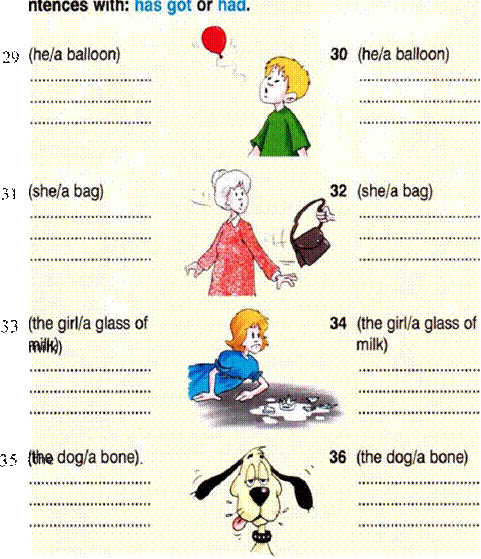 sentences with: has got r had.
sentences with: has got r had.
Fill in.• at, on or in.
Today
is Saturday. I don't go to school 37) ![]() Saturdays. I get up 38)
Saturdays. I get up 38) ![]() eleven o'clock 39)
eleven o'clock 39) ![]() . the morning and I watch TV. I eat
lunch 40)
. the morning and I watch TV. I eat
lunch 40) ![]() noon and 41)
noon and 41) ![]() the afternoon I always visit my grandmother. 42)
the afternoon I always visit my grandmother. 42) ![]() Saturday evening Dad always takes us
to the cinema
Saturday evening Dad always takes us
to the cinema
Fill in. at, on or in.
Today
is Easter Day, We have fun 43) ![]() Easter. 44)
Easter. 44) ![]() Easter Sunday we wake up early and we give each other chocolate eggs.
45)
Easter Sunday we wake up early and we give each other chocolate eggs.
45) ![]() 9 0'clock 46)
9 0'clock 46) ![]() the morning we go to church. We always have a lovely dinner 47)
the morning we go to church. We always have a lovely dinner 47) ![]() Easter Day and we usually visit our
grandmother 48)
Easter Day and we usually visit our
grandmother 48) ![]() . the afternoon.
. the afternoon.
3
Put the verbs in brackets into the present simple or the present continuous.
49 David![]() (wash) the
car at the moment' 50 My sister
(wash) the
car at the moment' 50 My sister![]() (eat) her
dinner now.
(eat) her
dinner now.
51
I
always![]() (do) my homework in the evening,
(do) my homework in the evening,
52
Mother
usually![]() (go) to the cinema at the weekend, 53 John
(go) to the cinema at the weekend, 53 John![]() (tidy) his
room now.
(tidy) his
room now.
54
They
usually![]() (go) on holiday in August.
(go) on holiday in August.
55
Jane
always![]() (go) to bed early.
(go) to bed early.![]()
56
Today
Tom![]() (go) to the beach.
(go) to the beach.
57
Father
usually![]() (sleep) on Saturday afternoon.
(sleep) on Saturday afternoon.
58
At
present he![]() (write) a letter. 59 1
(write) a letter. 59 1![]() . (go) to
the gym on Saturdays. 60 We usually
. (go) to
the gym on Saturdays. 60 We usually![]() (wake up) at
seven o'clock.
(wake up) at
seven o'clock.
Fill in the right word from the box,
mine, your(s), his, hers, its, ours, theirs, her, their
|
61 The radio is . |
(Tom) |
|
62 When is . 63 This book is |
(you) |
|
|
(Peter and Sue) |
|
65 These pens are . |
(Mandy and l) |
|
66 These flowers are |
(Mother) |
|
|
(Jane) |
|
68 That is |
(dog) |
|
69 Are these magazines |
(you) |
|
70 That car is |
(Sally and Tom) |
Fill in.• Is, Are, Do or Does.
71
![]() .you like eating chocolate?
.you like eating chocolate?
72
![]() .. you thirsty?
.. you thirsty?
73
![]() .. you going home now? 74
.. you going home now? 74 ![]() he go to
school in the morning?
he go to
school in the morning?
75
![]() he in bed now?
he in bed now?
76 they come from England?
![]() . you going swimming now?
. you going swimming now?
78 ![]() he like
Anne?
he like
Anne?
79 ![]() that a
penguin?
that a
penguin?
80 ![]() you go to
work every day?
you go to
work every day?
Fill in: Where, Who, What time, Why r Whose.
1 ![]() do you go to school? 7.30.
do you go to school? 7.30.
2cat is this? Peter's.
![]() 3is your mother? In the sitting-room.
3is your mother? In the sitting-room.
4. is Mary? She's my sister.
5
![]() . guitar is this? John's.
. guitar is this? John's.
6
![]() is my basket? On the table.
is my basket? On the table.
7
![]() is he tired? Because he works a lot,
is he tired? Because he works a lot,
8do you go to bed? 9.30,
9
![]() . is the man on the bicycle? Mr Smith.
. is the man on the bicycle? Mr Smith.
10 ![]() do you want an umbrella? Because
it's raining.
do you want an umbrella? Because
it's raining.
B Choose the correct item.
11
John![]() a new bike yesterday.
a new bike yesterday.
A bought B buying C buys
12
Mark![]() coffee at the moment.
coffee at the moment.
A
makes B made C is
making 13 We![]() to the cinema yesterday.
to the cinema yesterday.
A are going B went C go
14 Tomorrow he . his grandmother.
A visit B visited C is going to visit
15 She a new dress next week.
A buys B is going to buy C bought
16 Last month they on holiday to
France,
A go B are going C went
17 He ..![]() football in the park yesterday. A
plays B is playing C played
football in the park yesterday. A
plays B is playing C played
18 They![]() their dinner at the moment.
their dinner at the moment.
A ate B are eating C eat
19 She![]() a letter at the moment.
a letter at the moment.
A wrote B is writing C writes
20 1 my homework now.
A am doing B do C did
21 Simon the windows now.
A is going to clean B cleaned
C is cleaning
22 Last Easter they to their village.
A went B go C are going
23 1 my favourite cartoon yesterday.
A watched B am going to watch
C watch
24 Ben . a book now.
A is reading B reads C read
25 1 a new record tomorrow.
A am going to buy B buy C bought
26 He . the dog to the park yesterday. A takes B took C is going to take
27 They in a restaurant last night. A ate B are eating C eat
28 Listen! The birds in the garden. A sang B are singing C sing
29 They the car tomorrow.
A wash B washed C are going to wash
30 The girl![]() . to her mother now.
. to her mother now.
A talks B is talking C talked
C Fill in the gaps with: some r any,
|
Have you got |
38 I want |
candles for |
|
33 I don't have |
Dave's cake. |
|
|
34
Grandpa doesn't
have 35 We need |
39 Are
there . |
lollipops in the |
|
|
cupboard? |
|
|
36 There are D Complete the sentences. |
40 There are . |
birds in the |
![]()
![]()
![]()
![]()
![]()
![]()
![]()
![]()
![]()
![]()
![]()
![]()
![]()
![]()
![]()
![]()
![]()
![]()
![]()
![]()
![]()
![]()
![]()
![]()
![]() 37 Is there. coffee left?
37 Is there. coffee left?
41 ![]() (old) Ben is the
(old) Ben is the
42 (short) Tony is
43 (heavy) Tony is
44 (young) Mark is
45 (small) Tony's house
|
|
|
|
|
||
|
Tom |
John |
Paul |
|||
|
|
Age: |
24 |
15 |
20 |
|
|
Height: |
1,58m |
1,65m |
1,77 m |
||
|
|
|
|
Brown-long |
Black-long |
Black-short |
|
|
House: |
3 rooms |
4 rooms |
5 rooms |
|
|
|
|||||
Complete the sentences.
46
47 (big) Paul's house is
![]() John's.
John's.
48
49 ![]() (short) Tom is .Tom.
(short) Tom is .Tom.
John.
50 (long) John's hair is .
![]() Paul's.
Paul's.
Put the verbs in brackets into the past simple.
John: Where did you go on holiday last year?
Anne: 1
61) ![]() (go) to Spain to visit some friends.
(go) to Spain to visit some friends.
John: How long 62) ![]() (you/stay)?
(you/stay)?
Anne: 1
63) ![]() . (stay) there for three weeks and we 64)
. (stay) there for three weeks and we 64)![]()
(have) a lovely time. Where 65) (you/go) on holiday?
![]() John: 1 66) (not/go)
anywhere. My father 67)
John: 1 66) (not/go)
anywhere. My father 67)![]()
(be) ill
all summer so we 68) ![]() . (stay) at home. The doctor 69) .
. (stay) at home. The doctor 69) .![]() . (tell) my father to stay in bed and we 70)
. (tell) my father to stay in bed and we 70)![]()
Anne: Oh dear, that's too bad! John: Well, he's fine now.
I Put the verbs in brackets into the past simple.
Last
Saturday we went for a picnic at the beach, My father 71) ![]() (drive) the car. We 72)
(drive) the car. We 72) ![]() (listen) to music on the way and 73)
(listen) to music on the way and 73)
![]() (sing) songs. When we 74)
(sing) songs. When we 74) ![]() (arrive) we 75)
(arrive) we 75) ![]() (sit) on the sand and 76)
(sit) on the sand and 76) ![]() (make) sandcastles. We 77)
(make) sandcastles. We 77) ![]() (eat) our sandwiches and then we 78)
(eat) our sandwiches and then we 78)
![]() (play) on the beach. We 79)
(play) on the beach. We 79) ![]() (leave) the beach at five o'clock. We 80)
(leave) the beach at five o'clock. We 80) ![]() (have) a lovely day.
(have) a lovely day.
![]() . you a dancer? B: No I
. you a dancer? B: No I
![]() . she a nurse? 10 A
. she a nurse? 10 A![]() . he a doctor?
. he a doctor?
12
14 Has it got wings?
Answer as in the examples.
e.g. Can he play the guitar? e.g. Can it walk?
![]() . Yes, he can.... No,
it can't....
. Yes, he can.... No,
it can't....
16 Can he drive? 17 Can Sally sing?
E Change to the plural as in the example.
e.g. a foot two feet... 23 a potato
19
a tooth three![]() 24 a leaf
24 a leaf
20
a sheep eight![]() 25 a spy
25 a spy
21
a child four![]() 26 a man 22 a disc jockey two
26 a man 22 a disc jockey two![]()
F Fill in the blanks with This, These, That Those.
![]() This is a ball.
This is a ball. 
27 28![]()
is a record.
29 30![]()
are bananas.
![]() 2
3-4)
2
3-4)
Look at the pictures and write as in the example.
socks These
are Jeff's socks. .![]()
teacher 1 This is
ball 2 This is
car 3 This is
the girls dresses 4 These are
flowers 5 These are
guitar 6
This is .![]()
2 3•4)
B Look at the pictures and write as in the example.
|
e.g. I've got a balloon. It's ...mine... 9 Sue's got a basket. It's . |
7 They've got a car. 8 The man's got two children. It's They're 10 Sueand Jim have gottwo cats. 11 We've got a big house. They're It's .. |
C Write There is or There are as in the example.
e.g. . There is... a swing in the garden.
12 . three girls. 13 a table.
14 ![]() lots of flowers.
lots of flowers.
D Fill in some r any.
19 Are there . flowers in the garden?
20 There isn't milk in the fridge.
21 There is bread on the table.
![]()
![]() Fill in There is, There are, Is there
Fill in There is, There are, Is there
25 ![]() . any butter on this bread?
. any butter on this bread?
26any birds in the tree?
27some lemonade in the bottle.
15
16
17
18
22 Is there 23 There aren't 24 Is there
r Are there.
28
29
30
two dogs. a slide.
. two boys.
. a ball.
tea in the teapot? cars in the street cake in the cupboard?
a horse in the field? . any people in the room? some matches in the box.
![]() 3 5-6)
3 5-6)
A Write short answers as in the example.
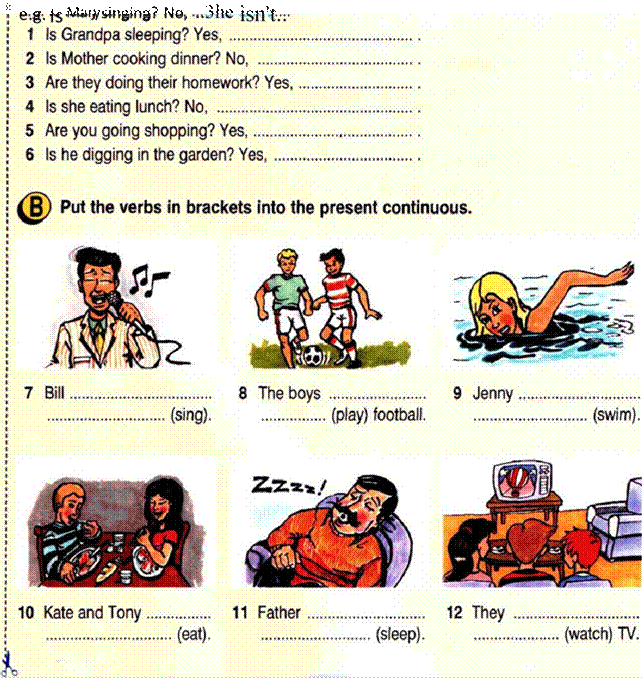
3 5-6)
|
13 |
|
16 1 |
drinking lemonade. |
|
14 They |
|
17 He |
|
|
15 |
|
18 She |
|
|
25 She . breakfast every morning, |
28
I always . |
|
A eats B is eating C eat |
evening. |
|
26 We usually basketball on |
A am listening B listens |
|
Saturdays. |
C listen |
|
A are playing B play |
29
Mother. |
|
C plays |
A cooks B is cooking C cook |
|
27 He |
30
They often |
|
moment. A dig B digs C is digging |
A go B goes C are going |
C ![]() Fill
in am, is, are, do or does.
Fill
in am, is, are, do or does.
D Complete the questions, then answer them as in the example.
![]() Do.... they like fish? No, ..they
don't....
Do.... they like fish? No, ..they
don't....![]()
19
![]() . you want some Coke? Yes,
. you want some Coke? Yes,![]()
20
![]() Jill do her homework every night?
No,
Jill do her homework every night?
No,![]()
21
![]() , they visit their grandparents
often? Yes
, they visit their grandparents
often? Yes![]()
22
![]() she help her mother? Yes
she help her mother? Yes![]()
23
![]() . your cat like fish? No
. your cat like fish? No![]()
24
![]() . Pete and Sue like pizza? Yes,
. Pete and Sue like pizza? Yes,![]()
E Choose the correct item.
Match the following with the pictures.
Close the window, please! - Please help me! - Let's watch TV, - Have a bath! - Don't eat in the classroom! - Be quiet, please! - Brush your teeth! - Let's make a cake.
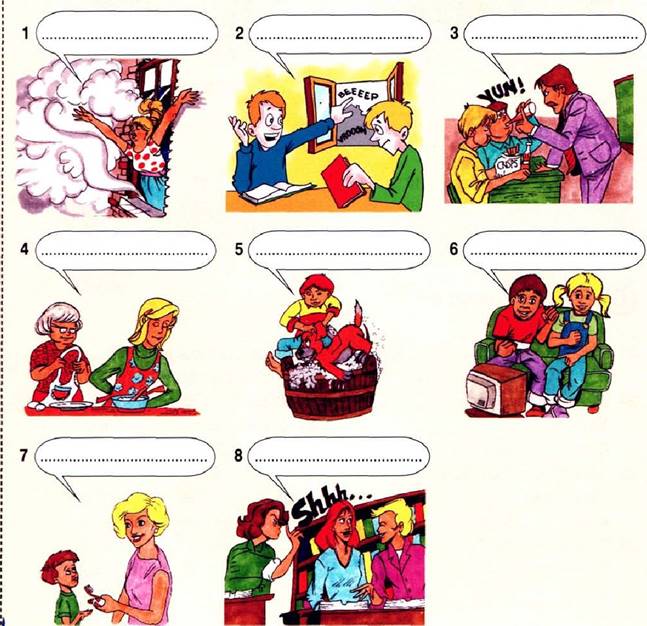
7-9)
B Look at the picture and fill in on, up, behind or between.
Mrs West is standing 9) the flowers. She is smelling them. Jenny is 10) the swing and Tom is climbing 11) the steps of the slide. There is a cat 12) the table and a dog 13) the table and the slide. There is a ball 14)
the tree.
C Fill in at, in or on.
|
|
2 0'clock |
21 the afternoon |
|
15 Mondays |
18 |
22 Wednesday |
16 June 19
![]() Christmas
Christmas
![]()
1972 20 . the winter
17
D Choose the correct item.
|
|
27 The shops close early |
|
23 1 don't go to school .........s...... Sundays. |
Wednesday afternoons. |
|
A on B at Cin |
A on B at Cin |
|
24 We always have
dinner ............... |
28 She was born 1964. |
|
6 0'clock. |
A in B on C at |
|
A at B in C on |
Easter is . the spring. |
|
25 1 usually go to the beach . |
29 A at B in C on |
|
the summer. A B on C at |
30 Tim always goes to the cinema . |
|
in 26 They never watch TV |
Saturday night. A on B in |
|
the evening. |
|
A at B in C on
|
NAME: CLASS: . |
DATE• MARK: (Time: 30 minutes) |
A Ask and answer as in the example.
![]()
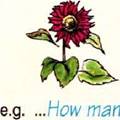 ...How many
...How many
flowers are there?![]()

![]()
![]()
Ask and answer as in the example.
![]() e.g. How much. milk is
there? .
e.g. How much. milk is
there? .![]() 1 litre....
1 litre.... ![]() . coffee is there?
. coffee is there?![]()
![]() bread is there?
bread is there? ![]() 10
10 ![]() sugar is there?
sugar is there?![]()
11 ![]() biscuits are there? .
biscuits are there? . ![]() 12
12 ![]() lemons are there? .
lemons are there? .![]()
13
![]() onions are there?
onions are there?![]()
14
bananas are
there?![]()
5 10-11)
C Write sentences as in the example.
e.g.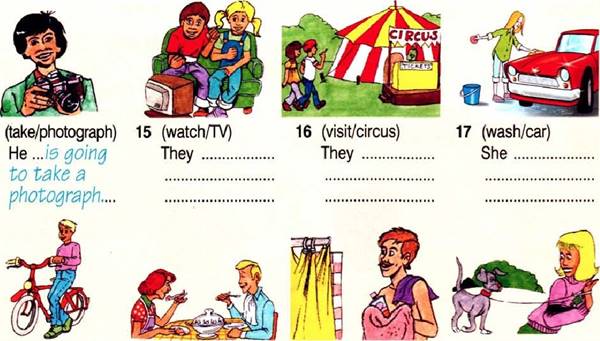
18 (ride/bicycle) 19 (eat/dinner) 20 (have/a bath) 21 (walk/the dog)
![]()
![]()
Write sentences as in the example.
e.g. (Bob/pilot) . .15 Bob going Co be a pilot?...
22 (Sue/singer)
23 ![]() (Tom & Bill/teacher) 24
(Pete/policeman) .
(Tom & Bill/teacher) 24
(Pete/policeman) .
25 (Anna/doctor)
E Answer the questions as in the example.
e.g. Is
Mary going to visit Jane? No, ...5he isn't..![]()
26 Are they going to stay at home? No,![]()
27 Is he going to cook dinner? Yes,![]()
28 Are they going to make a cake? Yes,
29 ![]() Is Tony going to wash the dishes? No,
Is Tony going to wash the dishes? No,
30 Are you going to play tennis? Yes,
 6 12•13)
6 12•13)
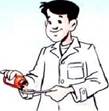

e.g. the boys/play drums
(love)
The boys love playing the drums.
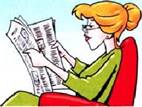
3 Laura/read newspaper
(like)![]()
![]()
![]()
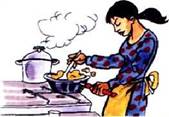
6 Mother/cook dinner
(hate)
![]()
![]()
![]()

4 dog/play with ball (like)
![]()
![]()
![]()

7 they/dig in garden (not like)

2 Mary/wash floor (hate)
![]()
![]()
![]()
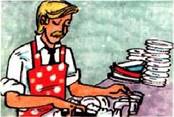
5 Father/do washing up
(not like)![]()
![]()
6 12-13)
B Mr Taylor is telling the boys what they must or mustn't do.
8 You do your homework.
9 You be late for school. 10 You talk in class.
11 You bring your books.
12 You eat in class.
13 You listen to me.
14 You study a lot.
15 You sleep in class.
16 You write on the walls.
C Match the sentences with the pictures.
|
17 You mustn't smoke in here. 18 You must take your medicine. |
20 You must water the plants. 21 You must not walk on the grass. 22 You mustn't talk here. |
D Mrs Rose needs to lose weight You are telling her what she must or mustn't do.
You 23) . . eat so much. You 24) eat sweets. You 25) eat ice cream. You 26) drink a lot of Coke. You 27) eat more fruit. You 28) eat vegetables. You 29) take some exercise. You 30) walk to work.
|
|
|
|
NAME: CLASS: |
DATE• MARK: (Time: 30 minutes) |
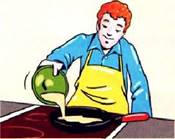
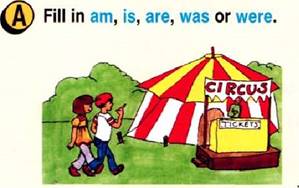
1 It
Saturday today. The children ![]() at the circus, They
at the circus, They ![]() at the zoo last Saturday.
at the zoo last Saturday.
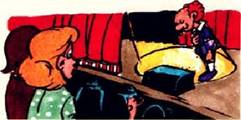
3 It Friday evening, Bill and
Mary at the theatre. They ![]() at work three hours ago.
at work three hours ago.
Answer the questions.
2 It
lunchtime and he .. ![]() in the kitchen. He at the supermarket in the morning.
in the kitchen. He at the supermarket in the morning.
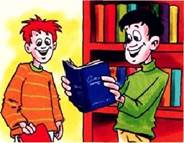
4 It ![]() Monday afternoon. Tom and Sid . in
the library. They
Monday afternoon. Tom and Sid . in
the library. They ![]() at school two hours ago.
at school two hours ago.
![]()
![]()
5 Was Mary at home yesterday? No,![]()
6 Were the children at school
yesterday? Yes![]()
7 Was Jim at work yesterday? Yes,![]()
8 Were Jim and Ann in the park yesterday? No,
7 ![]()
![]() . Sunday afternoon and my family and I
in the garden. We 11) outside
. Sunday afternoon and my family and I
in the garden. We 11) outside ![]() . hot. Yesterday it 13) . cold and it 14) . raining. We 15) in the house
all day. I like Sundays and I very happy today.
. hot. Yesterday it 13) . cold and it 14) . raining. We 15) in the house
all day. I like Sundays and I very happy today.
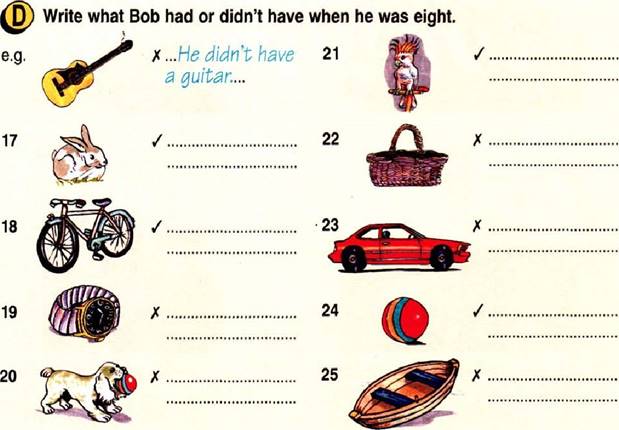
Write questions and answers as in the example.
![]() e.g. (Jill/Coke?/No) . Did Jill have
any Coke? No, she didn't.... 26 (Bob/ice cream?/Yes) 27 (Tim/jam?/Yes) .
e.g. (Jill/Coke?/No) . Did Jill have
any Coke? No, she didn't.... 26 (Bob/ice cream?/Yes) 27 (Tim/jam?/Yes) .
28 (Sue/cake?/No)
29 (Pam/apples?/No)
30 (Sam/bread?Nes)
![]() e
16-17)
e
16-17)
|
NAME: CLASS: |
DATE: MARK: (Time: 30 minutes) |
A What did Carol do last week? Answer as in the example.
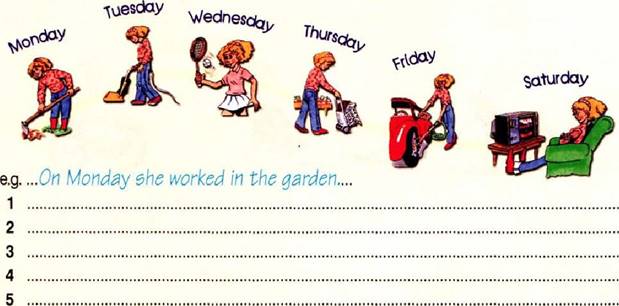
B Put the verbs into the past simple.
Yesterday my family and 1 6) . (visit) my grandparents. My  grandmother 7)
grandmother 7)
8 16•17)
C Fill in the blanks with a verb from the box in the past simple.
break, cut, send, read, ride, feed
|
13 He .. |
a letter |
14 She some |
15 He the : |
|
two days ago. |
|
bread a moment ago. |
newspaper this morning, |
|
16 The boy |
|
17 She |
18 He |
|
the dog two hours ago. |
the vase yesterday. |
the bike for an hour. |
|
D Put the verbs into the past simple.
19 1 (not/eat) breakfast this morning.
20 They (go) to the cinema last night.
21 My father (buy) a new car a month ago.
22 She (see) him in town last week.
23 We (swim) in the sea for two hours.
24 He (not/drive) to work yesterday. 25 Ann (come) home late from work yesterday.
C) Fill in yesterday, tomorrow, at the moment, every morning r last year.
26 We went to Paris for our holidays .
27 She is going to stay at home
28 They are digging in the garden
29 He gets up very early
30 They went to the cinema
![]() 9
18ui9)
9
18ui9)
Choose the correct word,
is it? It's a mouse. 4 ![]() . is your teacher? In the B Where C
What classroom.
. is your teacher? In the B Where C
What classroom.
A Who B Where C When . is that man? He's my father.
B Who C What 5 is that bag? It's Sally's. A What B Who C Whose do you tidy your room?
A Why B What C When
B Match the question words with the phrases.
A When?
B Whose? 8 Ten![]()
C How much? 9 2 0'clock, D Whyo 10 A fish.
E How many? 11 Sam's.
12 Because I'm cold.
C Fill in the blanks as in the example.
..smaller... . smallest... 16 big
17 happy
18 beautiful
e.g. The bike is cheaper... than the car, (cheap)
19 Bill is
John. (thin)
20 John is
Billy. (clever)
21
22 Sue is
23 Pam is
E Fill in than, of or In![]()
24 Bob is taller![]() Jim. 28 This book is more interesting 25 Our house is smaller
Jim. 28 This book is more interesting 25 Our house is smaller![]() theirs. that one.
theirs. that one.
26
Paula is the
cleverest girl![]() the 29 I live in the biggest town class. country,
the 29 I live in the biggest town class. country,
27
Tom is the nicest
boy![]() all. 30 John's car is faster
all. 30 John's car is faster
![]()
![]()
![]() carefulemptyhospital
carpeteveninghousewife abilitycartoonseveryhousework abovecatcheveryonehow many
acrosschickenevidencehow much actionChristmasexamplehungry addchurchexpensive
adjectivecinemaexpress adverbcircus aftercity afternooncleverimperative ageclimbin
agoclothesfamousin front of alongclownfavouritein turn alwayscoldfeedinside
amongcolumnfieldintention angrycomparativefightfinallyinterestinginto
animalcomparisonfishiron anothercompetitionflooritem anywherecompletefly
armchairconsonant arrivecorrectfollowed at presentcostfoodfootball boots at the
momentcoughjacket auntcountablefrequencyjam
carefulemptyhospital
carpeteveninghousewife abilitycartoonseveryhousework abovecatcheveryonehow many
acrosschickenevidencehow much actionChristmasexamplehungry addchurchexpensive
adjectivecinemaexpress adverbcircus aftercity afternooncleverimperative ageclimbin
agoclothesfamousin front of alongclownfavouritein turn alwayscoldfeedinside
amongcolumnfieldintention angrycomparativefightfinallyinterestinginto
animalcomparisonfishiron anothercompetitionflooritem anywherecompletefly
armchairconsonant arrivecorrectfollowed at presentcostfoodfootball boots at the
momentcoughjacket auntcountablefrequencyjam
fridge cousinjob
friendly
cryfrontjoke baconcupboardfunjumper bankcyclistfunny bark future basket bathkeep off beachdance floorkiss beardaughtergameknife beautifuldeergarden beforedefin itegoldfish
behinddemonstrategoose
belowdentistgrandmother besidedifferencegrandparentslady betweendiggrasslast
biscuitdiscogreengrocer'slate blankdiveguesslater blanketdivideguitarlazy
blondedollgymleader bonedoorwayleg borrowdoublelet's bowldownlibrary
bracketsdrawhanglie brush drawer happen![]() like
butcherdrummerhatelion-tamer byhave a good timelittle headachelollipop
cheavylong heightlook after caféeachhilllook for cageEasterholidaylots
of cameraelectricity billhooplove
like
butcherdrummerhatelion-tamer byhave a good timelittle headachelollipop
cheavylong heightlook after caféeachhilllook for cageEasterholidaylots
of cameraelectricity billhooplove
Word List
![]()
![]() lovely permanentsocksv
lunch personal pronounsofa lunchtime pet shopsomevegetables
placesometimesvowel planson plantspaghettiw pocketspelling magazine pointspendwake
magician politespiderwarm match poorspoonwater matchbox popcornspringweather
meal positivespyweekend meat possessivestarweight medicine possessive
casestationwhat mess posterstealwhen midnight pramstorywhere
monster preferstraightwh isper more prepositionstressedwho
motorbike presentsubjectwhose move previoussugarwhy must prohibitionsummerwife
mustn'tsuperlativewin swimming poolwine swingwing
lovely permanentsocksv
lunch personal pronounsofa lunchtime pet shopsomevegetables
placesometimesvowel planson plantspaghettiw pocketspelling magazine pointspendwake
magician politespiderwarm match poorspoonwater matchbox popcornspringweather
meal positivespyweekend meat possessivestarweight medicine possessive
casestationwhat mess posterstealwhen midnight pramstorywhere
monster preferstraightwh isper more prepositionstressedwho
motorbike presentsubjectwhose move previoussugarwhy must prohibitionsummerwife
mustn'tsuperlativewin swimming poolwine swingwing
nanny winner
nationality quickly
wonderful necessity wood never next nicetail rabbit
noonteapot nose recordtemporaryyear note reportertextyesterday now restaurantthan nurse richthat - those ridethenz o right nowthief object roofthis - thesezebra obligation roomthroughzoo round
octopustidy office rugtime expression rugby
ontired oncetoast oppositestodaytogether
orange juice out of salarytomorrow outdoors sandwichtonight outside scoretouch over seasontravel ox secretarytree-house seldomtrick sentencetrunk shirttwice
shopping bag paperuncountable
short parkunder
shout at parkedunderline
sick pastup
sitting-room pawusually
slide pen
penfriend snow
|
Present
|
Explain the verbs in your mother tongue. |
Past |
Explain the verbs in your mother tongue. |
|
am I is / are |
|
was / were |
|
![]()
![]() breakbroke bringbrought buybought
catchcaught comecame costcost dodid drawdrew drinkdrank drivedrove eatate
feedfed findfound flyflew forgetforgot getgot givegave gowent havehad hithit
hurthurt keepkept learnlearnt / -ed leaveleft loselost makemade putput readread
fiderode ringrang runran saw sendsent singsang sleepslept speakspoke spendspent
swimswam taketook teachtaught telltold throwthrew winwon
breakbroke bringbrought buybought
catchcaught comecame costcost dodid drawdrew drinkdrank drivedrove eatate
feedfed findfound flyflew forgetforgot getgot givegave gowent havehad hithit
hurthurt keepkept learnlearnt / -ed leaveleft loselost makemade putput readread
fiderode ringrang runran saw sendsent singsang sleepslept speakspoke spendspent
swimswam taketook teachtaught telltold throwthrew winwon
ENGLISH GRAMMAR
ROUND-UP
Making grammar practice fun for young learners
ROUND-UP is a 7-level series for young learners from beginner to upper-intermediate. It combines games and fun with systematic practice of English grammar.
Colourful boxes and tables present language clearly
Lively, illustrated exercises and games make practice fun and effective
• Pre-Tests identify students' difficulties
• Regular Revision sections and Progress Tests consolidate language learning
• CD-ROMs provide more grammar practice and games
• Teacher's Guide includes answer keys and extra photocopiable tests
Use ROUND-UP
for revision
We recommend Penguin Readers Easystarts — Level 5 for use with the ROUND-UP series
An rpunp-heaen 2-ïEAH
EBPOKHTA095 956-4133
095 956-4134 éHa: 189.00
ISBN 0-582-82339-0
|
PEARSON Longman |
9 80582 8 339 |
www.longman.com
Материалы на данной страницы взяты из открытых источников либо размещены пользователем в соответствии с договором-офертой сайта. Вы можете сообщить о нарушении.